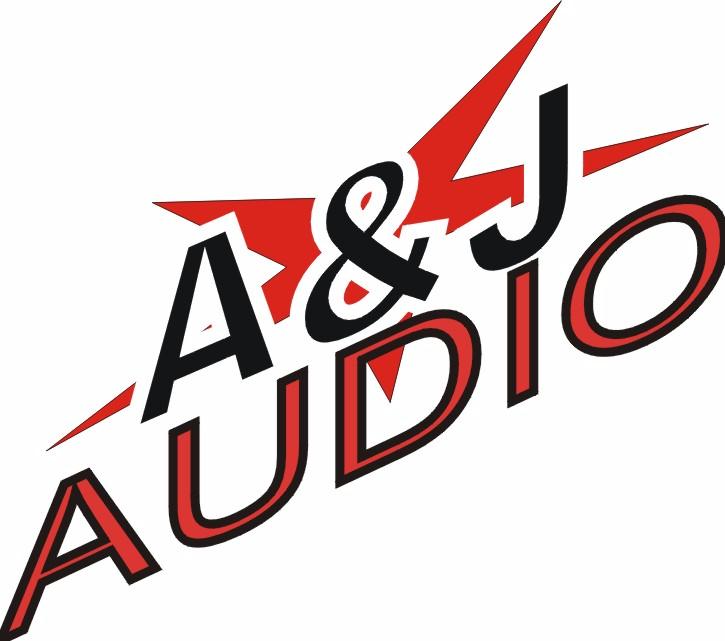

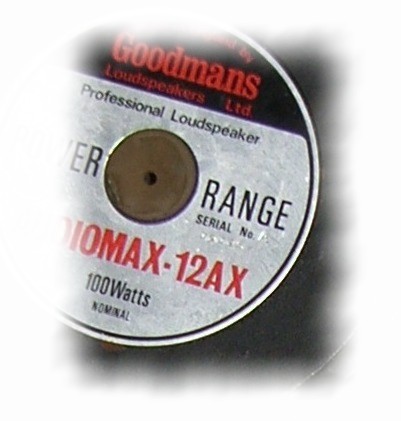 British Made Loudspeakers Hall of Fame
British Made Loudspeakers Hall of Fame
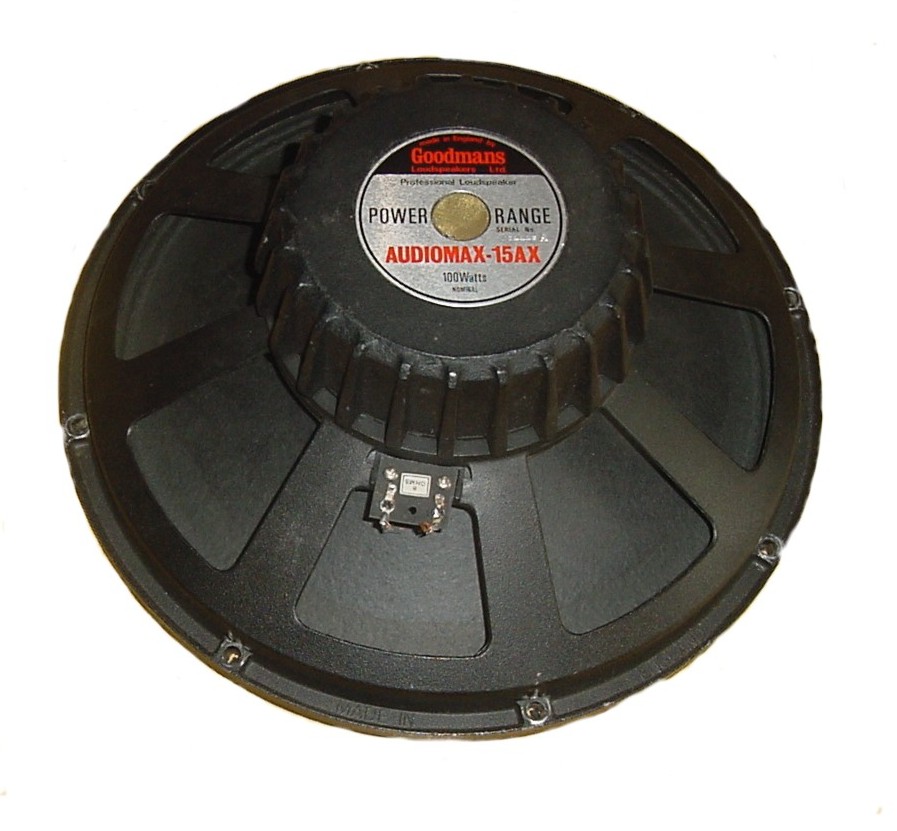
A look back to the glory days past of quality British manufactured Speakers.
See below a Goodmans Power Range Speaker catalogue from the mid 1970s
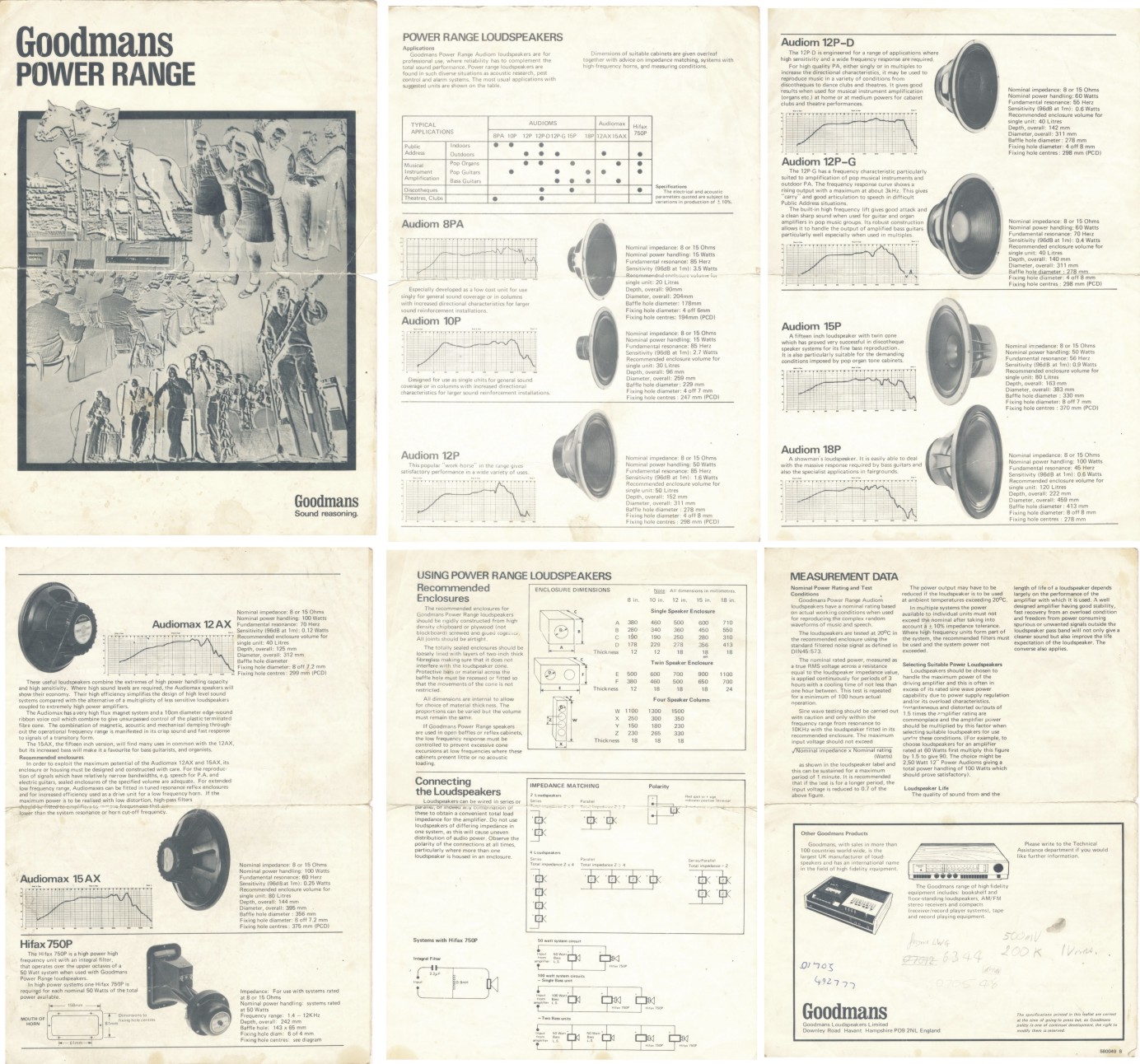
See some actual examples below of the speakers featured in the above catalogue
See below two Goodmans Power Range Speaker catalogues from 1980 and 1984
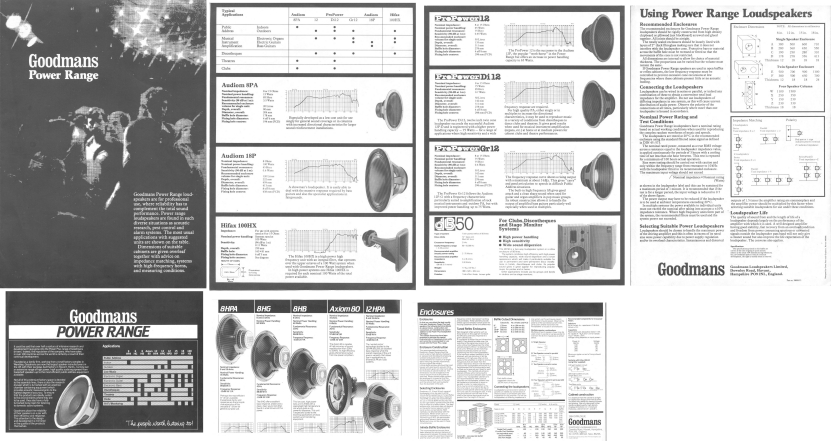
By kind permission of Right foot shifter
See some actual examples below of the speakers featured in the above catalogue
Some interesting information about Goodmans
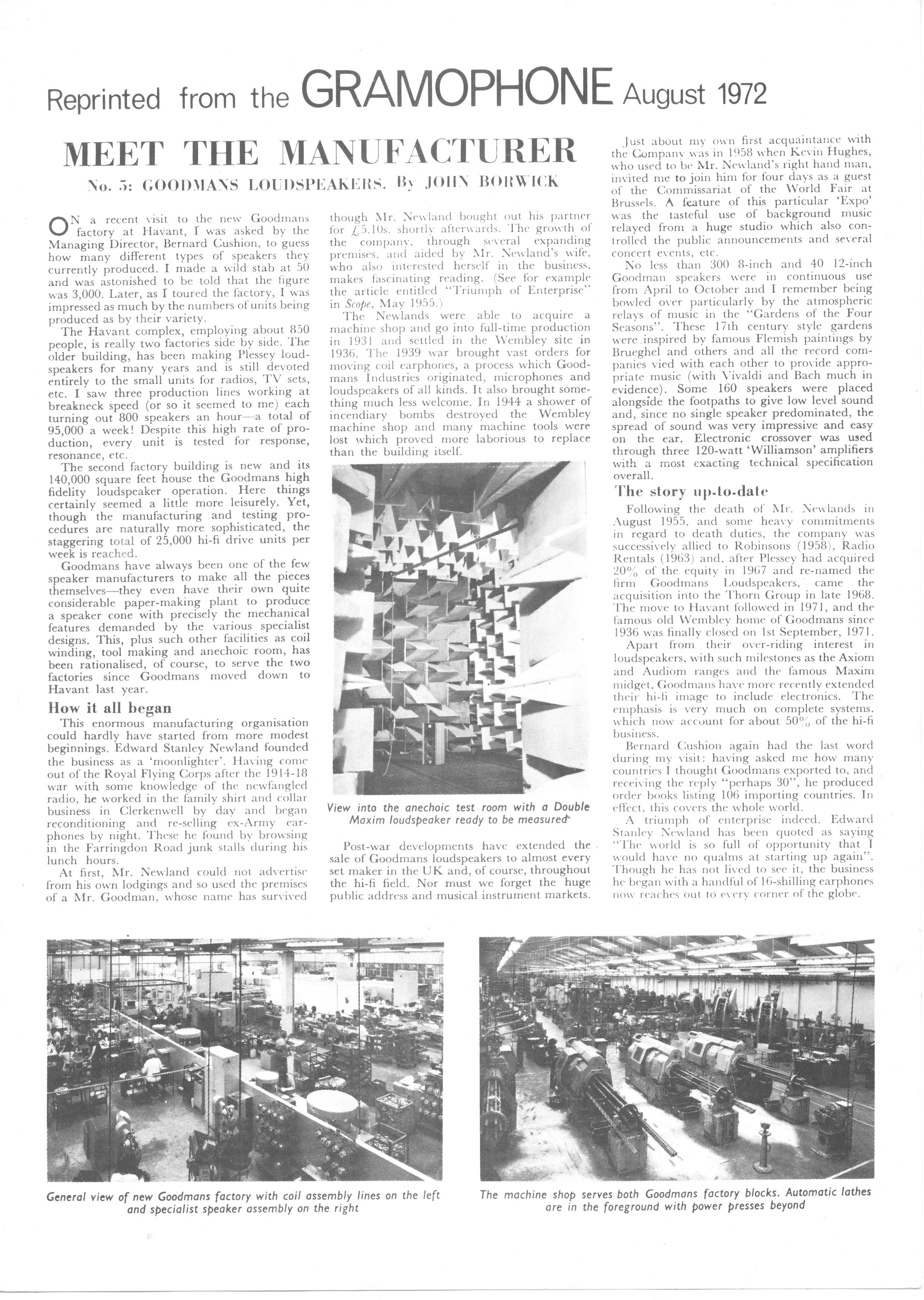
By kind permission of Right foot shifter
See some actual examples below of the speakers featured in the above catalogues
Made by Goodmans loudspeakers Ltd Havant England
Probably the best hundred watt speakers available in the 1970s
Goodmans 12AX and 15 AX
See below a 15AX
Cast Aluminium chassis with large magnet and cast heatsink
Fundamental resonance 60Hz
Nominal power handling 100 watts
4" edge wound vented voice coil
Super efficient 96dB @ 1 metre 0. 25w
Cork mounting face
From the below 1977 price list we have done a historic price comparison
1977 price of £49.00 converts to a 2013 price of £258.00
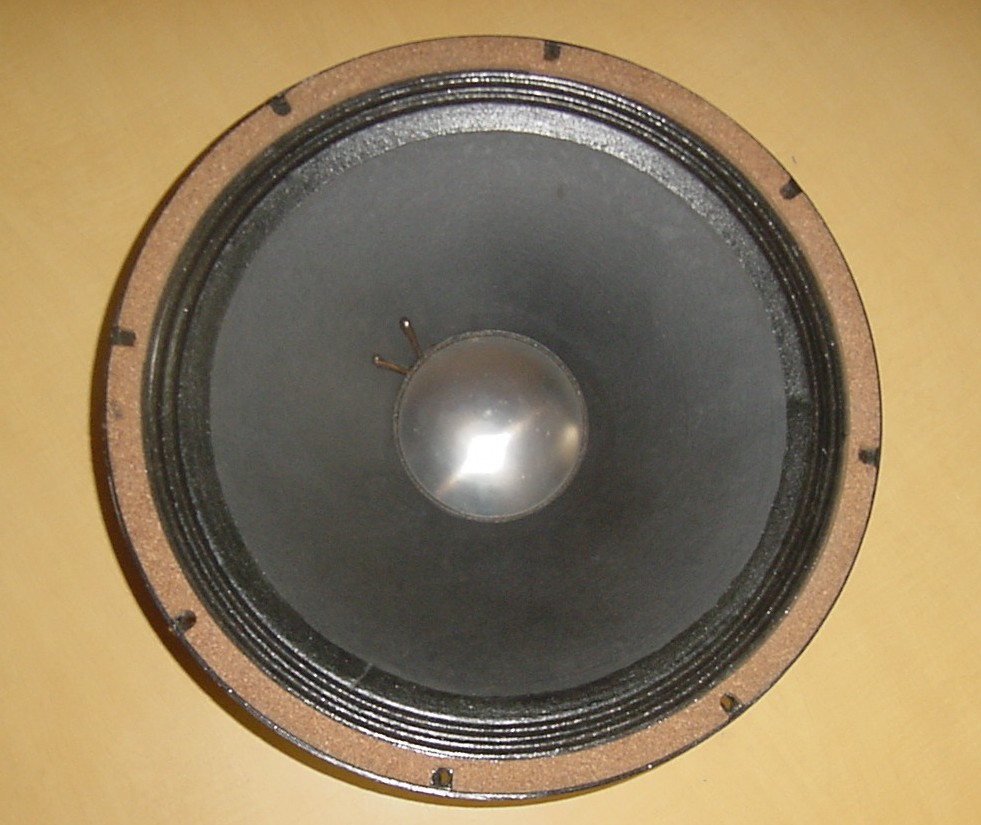
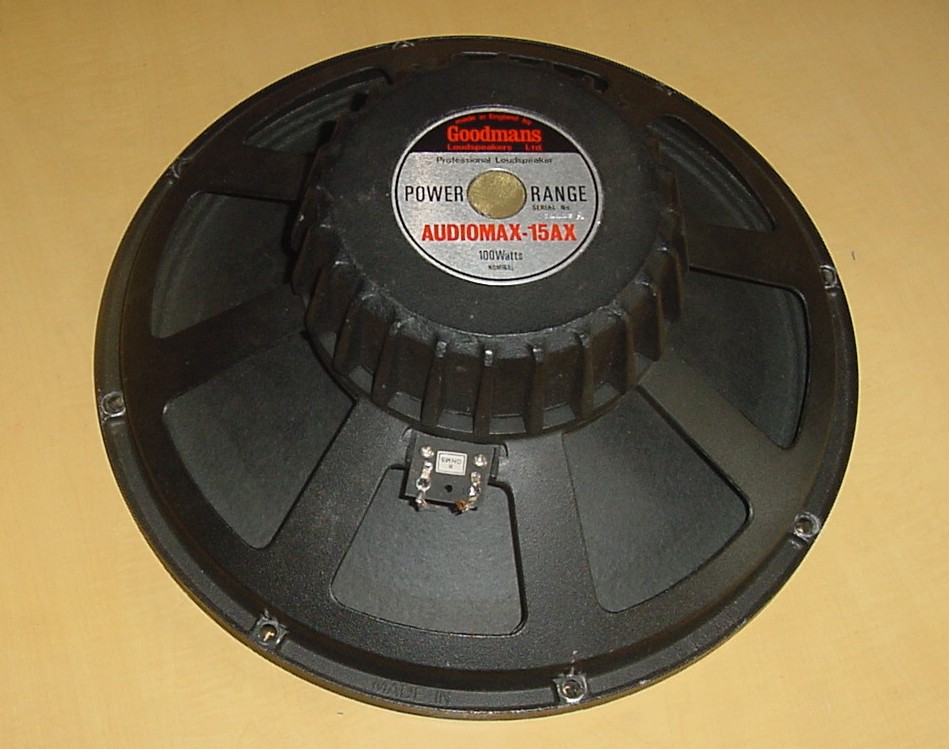
See below a 12AX
Cast Aluminium chassis with large magnet and cast heatsink
Fundamental resonance 70Hz
Nominal power handling 100 watts
4" edge wound vented voice coil
Ultra efficient 96dB @ 1 metre 0.12w
Cork mounting face
From the below 1977 price list we have done a historic price comparison
1977 price of £44.00 converts to a 2013 price of £231.00
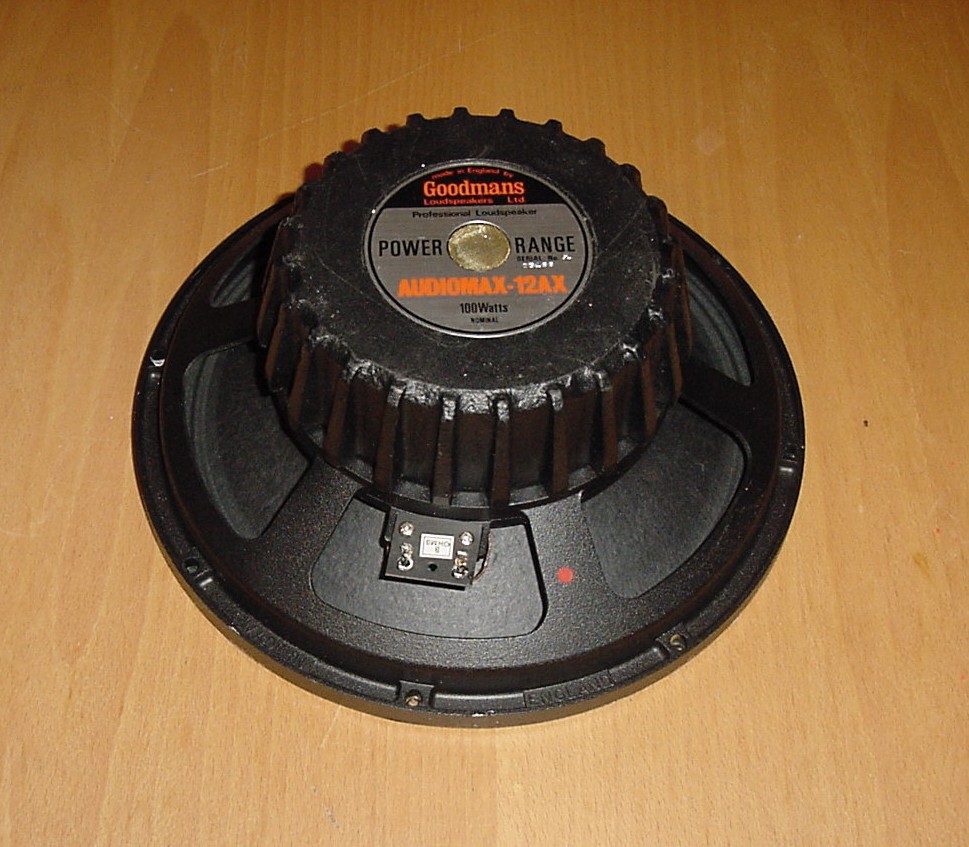
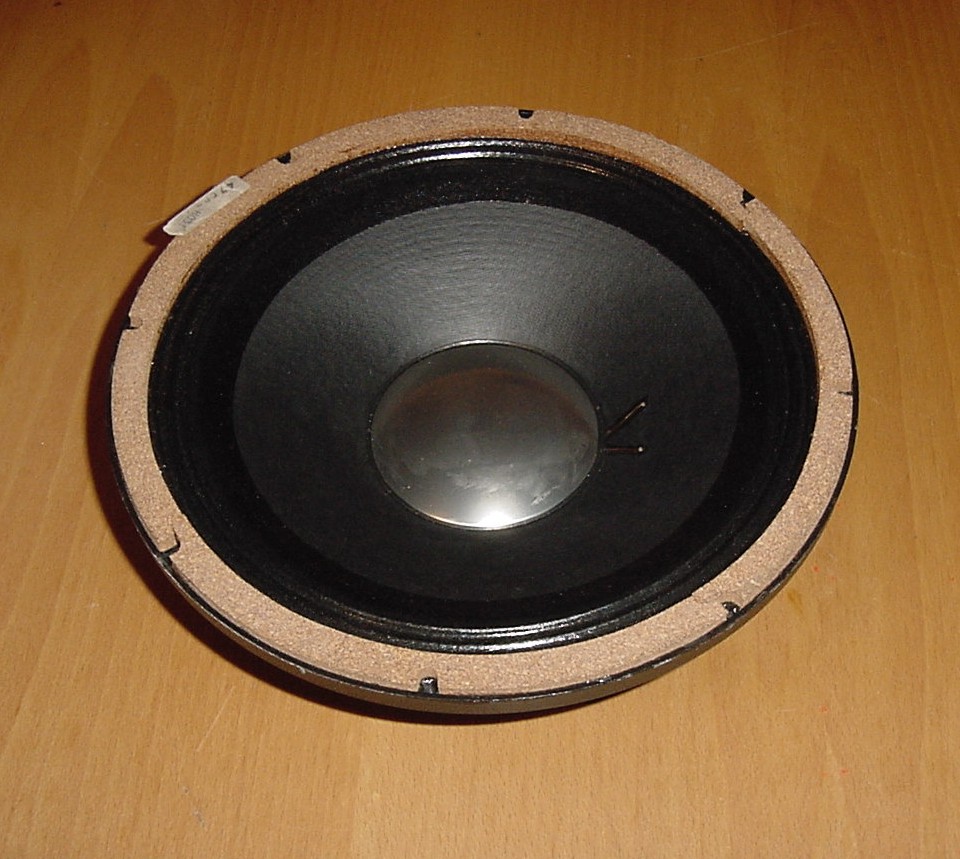
The above speaker is new out of the box and has never been used - could this be the worlds best Audiomax ?
The outstanding performance features of these Audiomax drivers was there efficiency and very fast speed of response to transient signals.
To put the efficiency of these drivers in to context theTF1225e a current 12" driver from Celestion with an edge wound voice coil has spec of 96 dB @ 1metre 1 w which means the Goodmans 12AX is 8 times as efficient.
key to this superb performance are in the following features:
The 10cm / 4" edge wound coil
The Audiomax coil utilizes a rectangular cross section wire , this reduces the gaps in the windings that occur when using conventional round wire for voice coils - increasing efficiency, the fact that this coil was 4" in diameter was virtually unheard of in the 1970s, even the Goodmans 18P only had a three inch coil, the increased size adds to greater control of the cone as no part of the cone is very far from the motor coil, the coil is also vented via the rear of the speaker to take away heat, the net result is a highly efficient coil exerting unsurpassed control of the cone, another effect of having a lager coil is that when in use a speaker voice coil heats up and its resistance increases, this causes thermal compression. explanation of thermal compression A larger coil combined with good thermal management such as employed by the Audiomax will minimize this effect.
Apparently the coil was quite difficult to wind, however if it was easy everyone would have done it, and is a testament to the Goodmans workforce superb technical ability.
The high flux magnet system
Ensures maximum efficiency, this has a cast aluminium heatsink assembly pressed over it maximizing the heat that is radiated away.
The plastic terminated fibre cone and aluminium dome
The aluminium dome gives some high frequency lift at around 4khz and also aids stiffening helping to reduce cone beak up (a phenomenon where the cone will move in anti-phase to the coil at certain frequencies) and also aids cooling dissipating heat from the voice coil.
Although by today's standards the 100w rating might seem a little low, It has to be remembered that when these Audiomax speakers were first produced nothing else even came close to the performance these drivers offered, they were at least as good if not better in performance than the JBL K120 and K130 from the USA at less than half the price.
Even now they will out perform most modern 100w drivers, as virtually all of the current innovation in design is found on ultra high power speakers, the Goodmans12AX could well be considered as the best 12" 100w PA speaker of all time.
I personally remember a road show in the 1970s running 8 12AX speakers in ported cabinets, the sound was unbelievably crisp and clear as well as incredibly loud.
GOODMANS AUDIOMAX KING OF SPEAKERS !
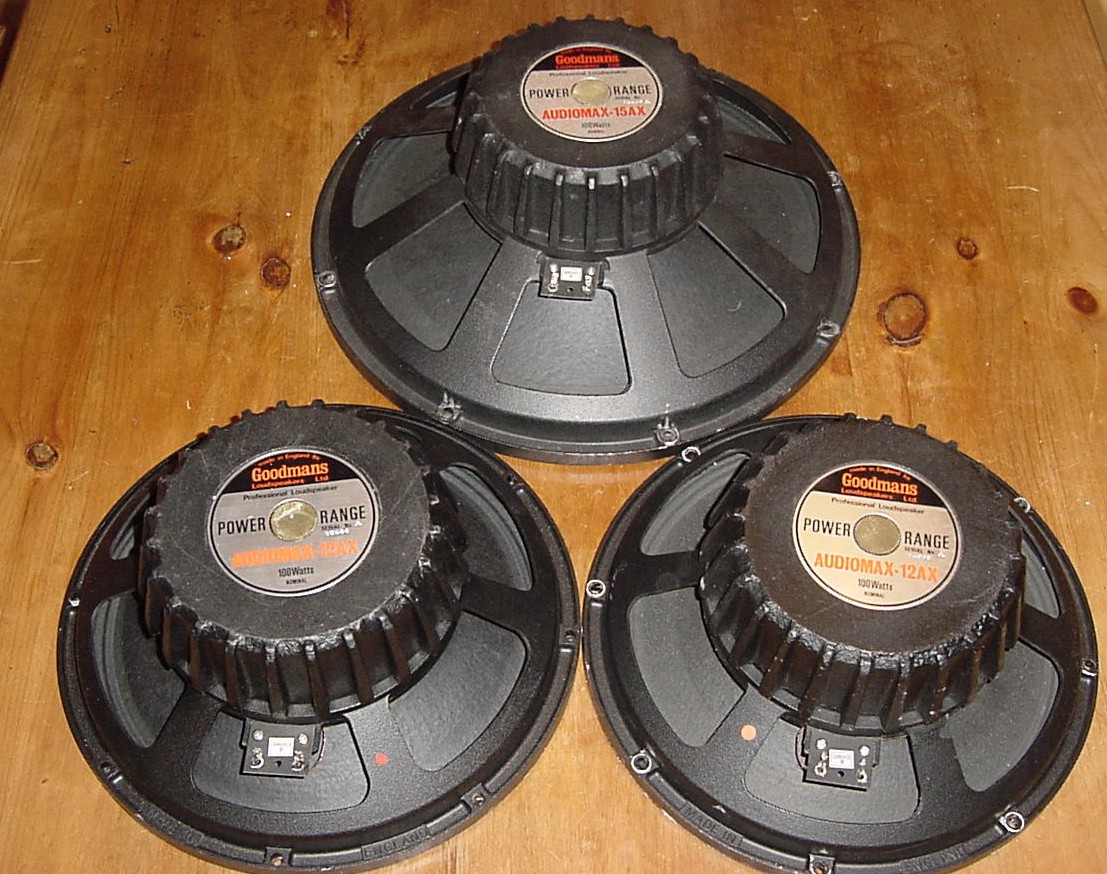
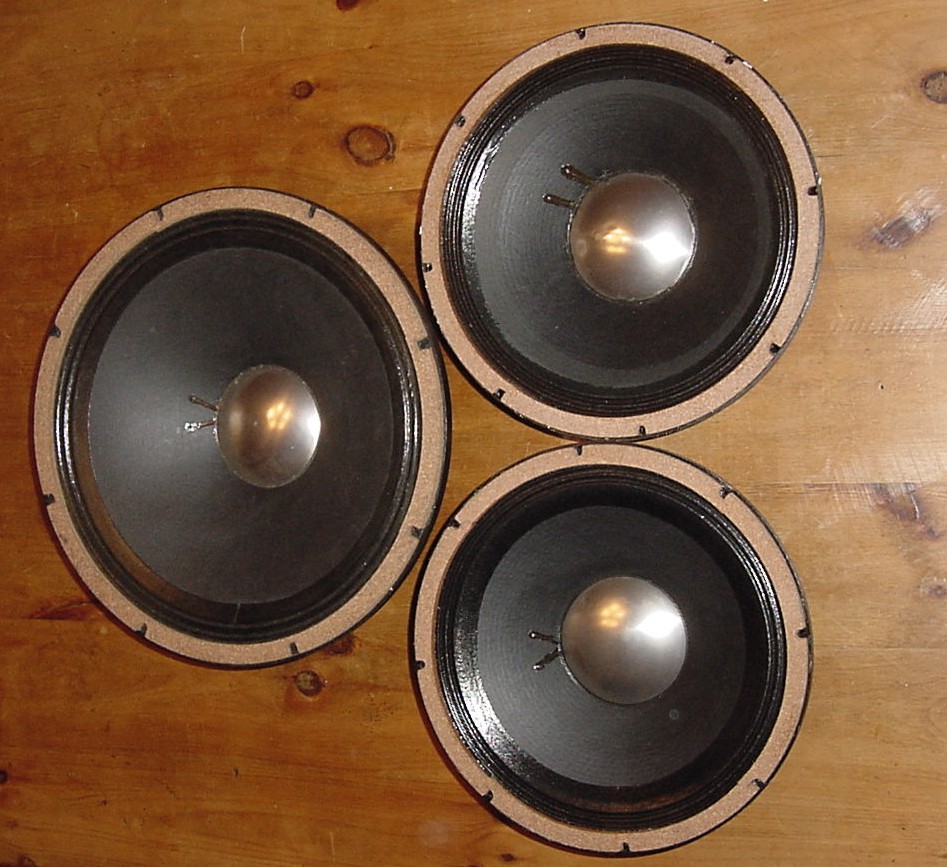
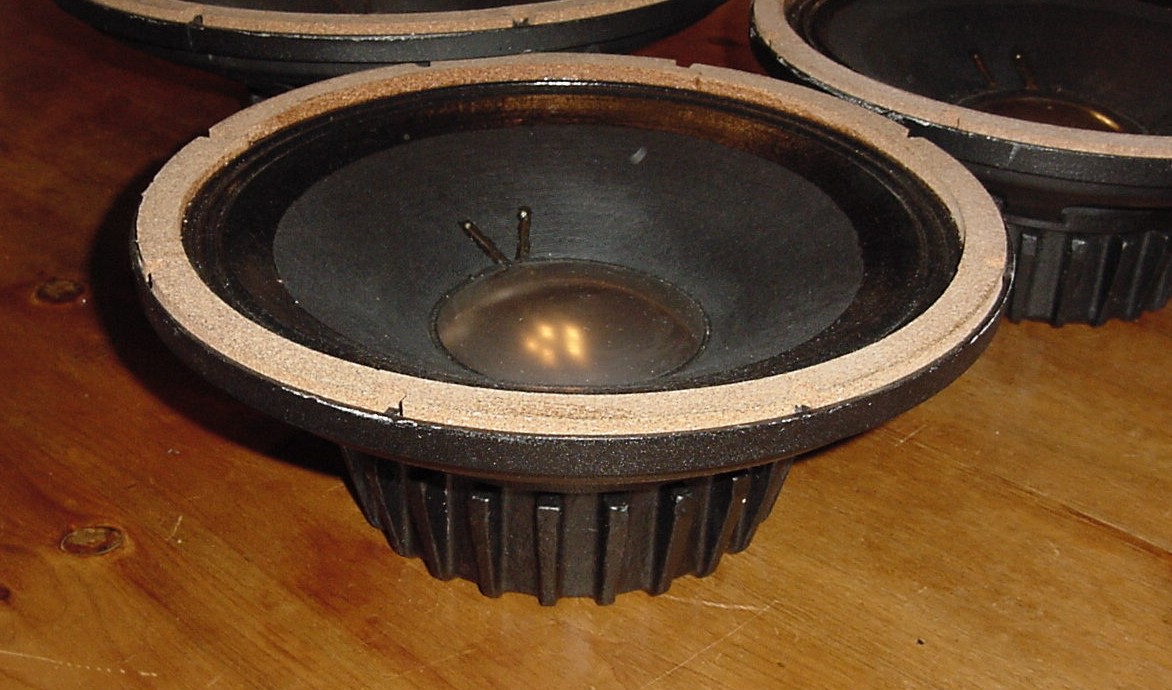
Made by Goodmans loudspeakers Ltd Havant England
See below the 15P
Die cast Aluminium chassis with large magnet
Fundamental resonance 56Hz
Nominal power handling 50 watts
1" 3/4 voice coil
Twin cone
Medium efficient 96dB @ 1 metre 0. 9 W
From the below 1977 price list we have done a historic price comparison
1977 price of £24.00 converts to a 2013 price of £126.00
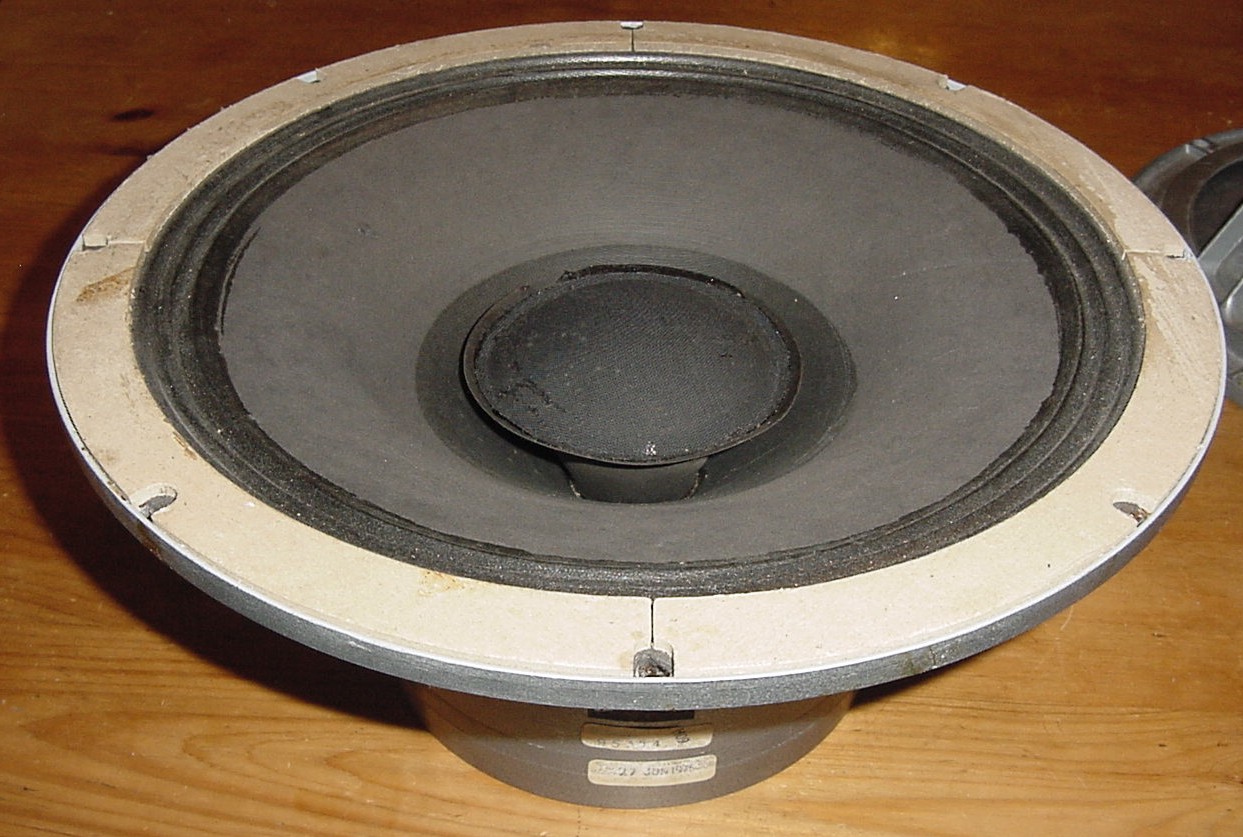
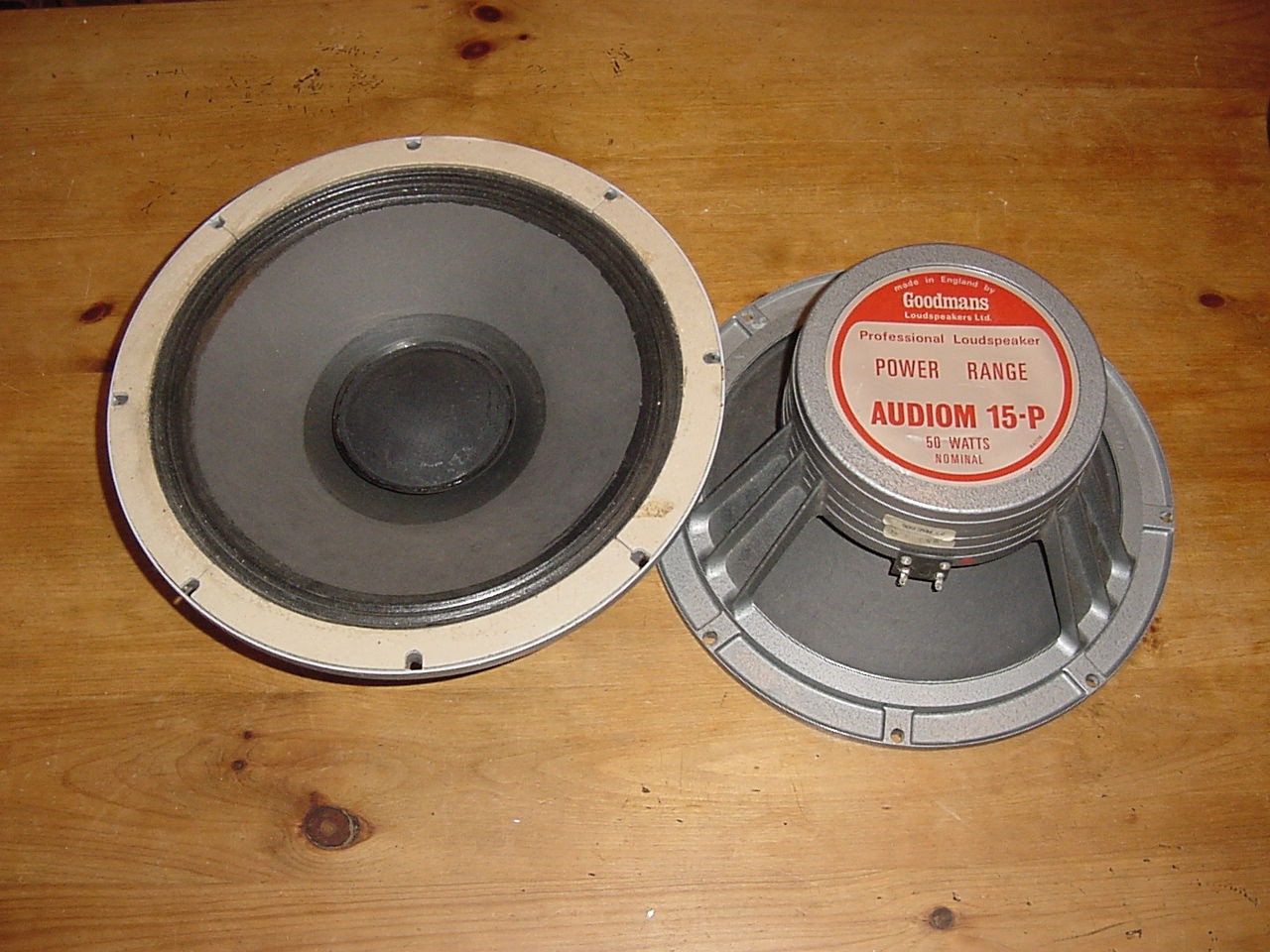
These 15" twin cone speakers were very useful in their day, as you could easily get away with just having 2 of these drivers per cabinet and with 2 cabinets effectively have a full range 200w speaker system, with a usable frequency response from below 60 Hz to over 10 kHz with no tweeters - this was not to bad in the 1970s, as there was no such thing as CDs and some Discos were still running crystal cartridges/stylises with a limited high frequency response, also for cabaret and general PA work they were all you required, as amplifier powers were a lot lower in those days - they were an ideal choice giving good efficiency excellent bass as well as reasonable high frequency performance when used in large rooms and dance halls.
There were probably many fixed installations using these speakers from holiday camps and clubs to theatres, they do however seem to be from a different era compared to the 12Ps and Audiomax, as the 3 spoke die cast chassis did not appear on any other speaker in the power range, also the Hamerite finish looks rather more old fashioned than the plain black of the 12Ps,
We have a pair these, one from1975 and one from 1976, they have a very sweet full range sound, I have not come across any modern twin cone 15" speakers, these days up to 12" is normally the largest size available, incidentally the frequency response of these drivers is very similar to the current 12" Celestion TF1218TC
Made by Goodmans loudspeakers Ltd Havant England
See below a 12PG
Pressed steel chassis with large magnet
Fundamental resonance 70Hz
Nominal power handling 60 watts
1" 3/4 voice coil
Very efficient 96dB @ 1 metre 0. 4 W
From the below 1977 price list we have done a historic price comparison
1977 price of £17.75 converts to a 2013 price of £93.56
This 12PG 12" speaker was one of the three in the power range 12" pressed steel drivers from Goodmans, the other 2 being the 12P and the 12PD.
This model features a 60w rating, when first produced the 12PG and indeed the 12PD were only rated at 50w, the driver is a baby Audiomax in looks and performance, these speakers were generally considered to be engineered for guitar and bass guitar - however they were used for just about everything, as can be seen they appear to be the granddaddy of modern pressed steel units - not to dissimilar to the Celestion TF range.
Usually doubled up in 2 x 12" cabinets with tweeters to give a 120w per channel power rating for Disco and PA use, with a very good solid sound, also of course found in combo guitar amps and 4 x 12 guitar speaker cabinets.
The shiny aluminium dome gives some high frequency lift at about 3 khz and this also aids cone stiffness, the driver features an 1" 3/4 voice coil vented at the rear,
Being pressed steel they are quite light and were also quite cheap.
GOODMANS 12PD 50w
Made by Goodmans loudspeakers Ltd Havant England
See below a 12PD
Pressed steel chassis with large magnet
Fundamental resonance 55Hz
Nominal power handling 50 watts
1" 3/4 voice coil
Twin cone
Very efficient 96dB @ 1 metre 0. 6 W
From the below 1977 price list we have done a historic price comparison
1977 price of £17.75 converts to a 2013 price of £98.84
GOODMANS 12PD 60w
Made by Goodmans loudspeakers Ltd Havant England
See below a 12PD
Pressed steel chassis with large magnet
Fundamental resonance 55Hz
Nominal power handling 60 watts
1" 3/4 voice coil
Twin cone
Very efficient 96dB @ 1 metre 0. 6 W
From the below 1977 price list we have done a historic price comparison
1977 price of £17.75 converts to a 2013 price of £98.84
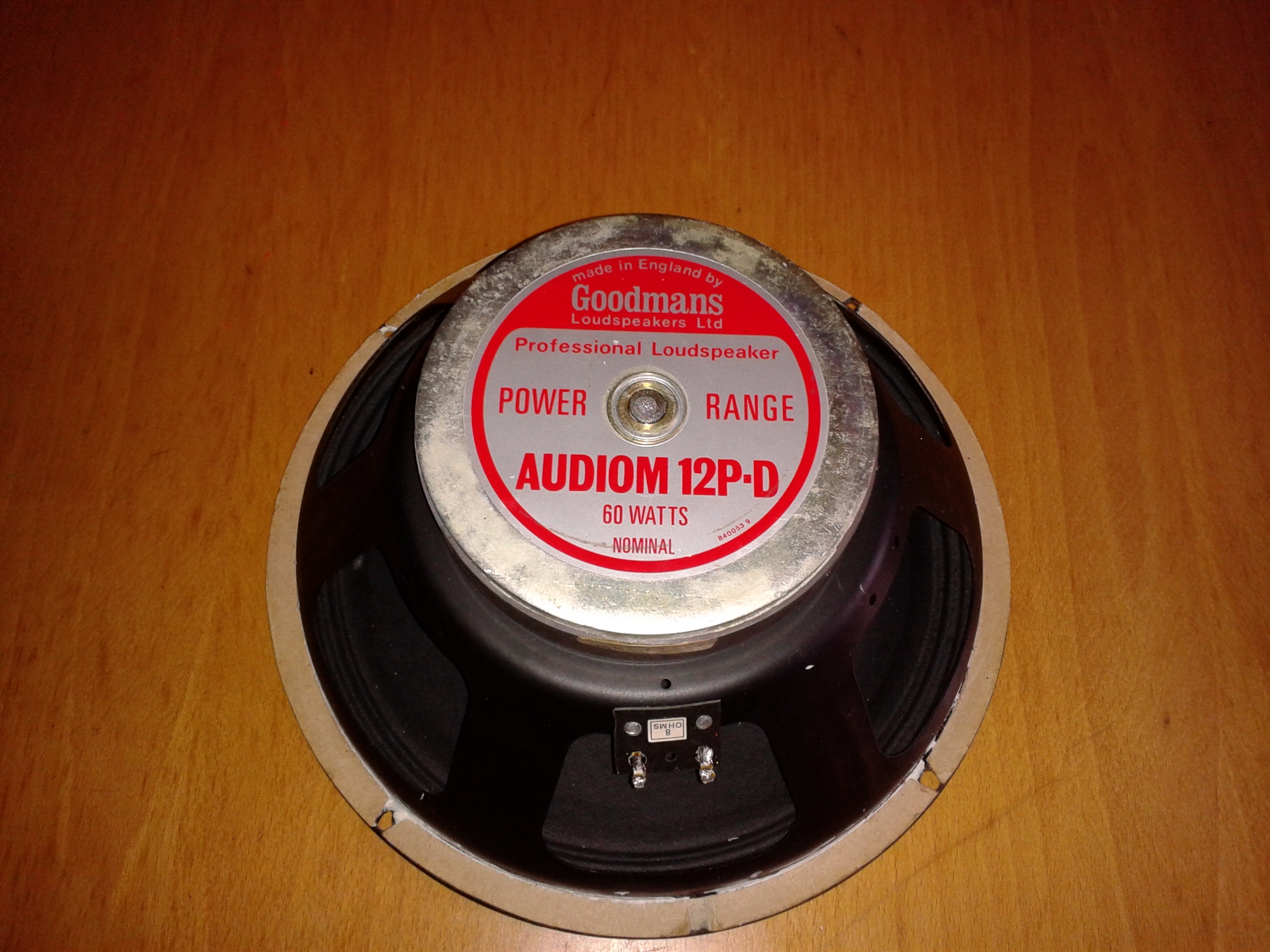
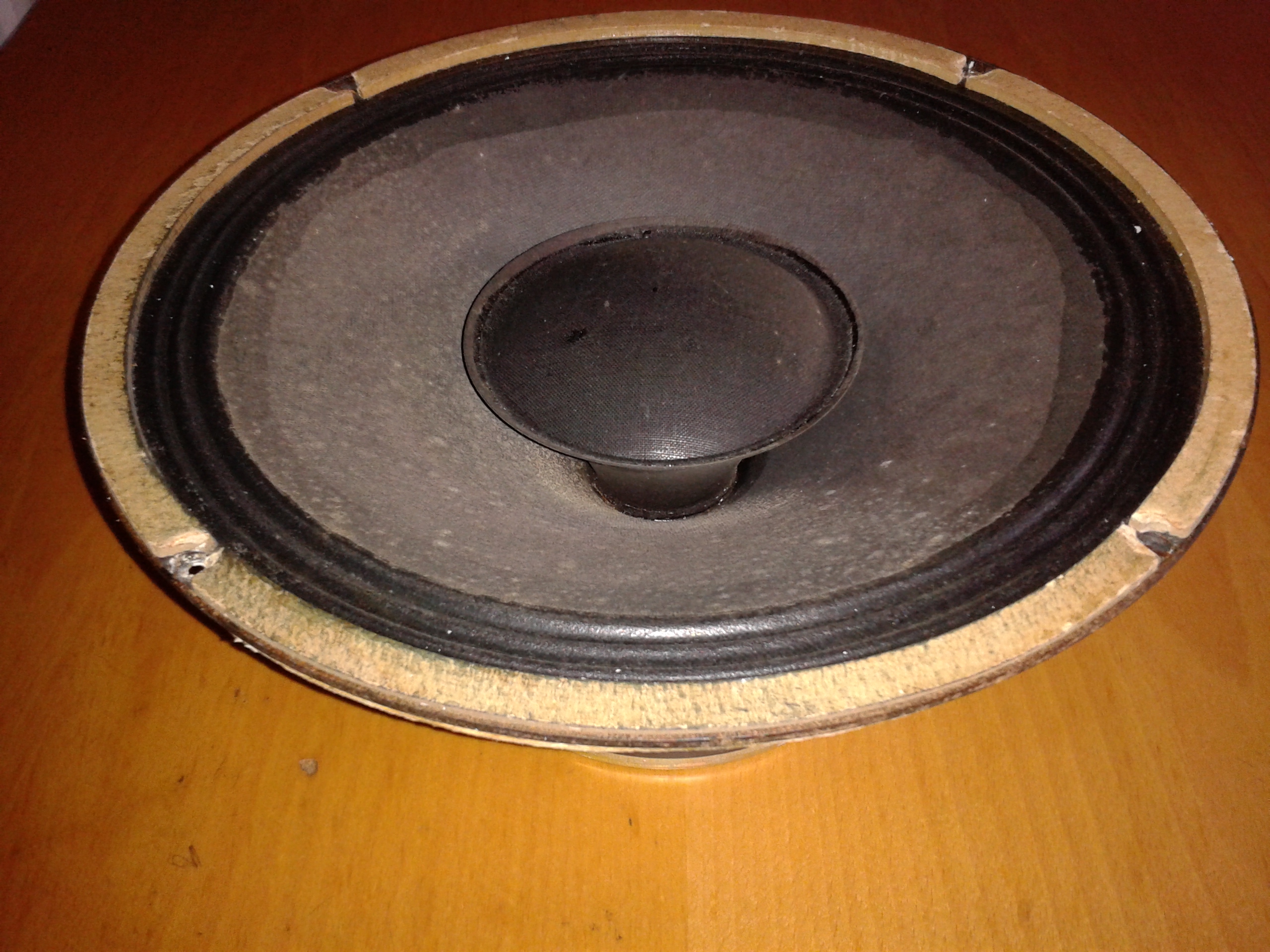
The 12PD 12" speaker was one of the three in the power range 12" pressed steel drivers from Goodmans, the other 2 being the 12P and the 12PG as above.
The early model in the top photos features a 50w rating, when first produced the 12PG and 12PD were only rated at 50w, the later models had a 60w rating as featured in the bottom photos, these speakers have a twin cone and were engineered for Disco and full range PA use, the twin cone design is very similar to the 15P.
Usually doubled up in 2 x 12" cabinets with or without tweeters to give a 100w or 120w (depending on which version) per channel power rating for Disco and PA use. Like the 15P very good Bass and high frequency performance.
The small secondary cone gives high frequency lift up to about 10Khz, in fact the frequency response is very flat from 100hz to10Khz, the driver features an 1" 3/4 voice coil vented at the rear.
When budgets were tight these drivers were often used without tweeters - before the first Motorola Piezo electric horns became available at a very low price (about £10.00) the only other option was a tweeter and crossover, that would probably cost as much as the main driver, doubling the price of each speaker cabinet, however I personally ran these type of 12PD drivers without tweeters for some years with no problems, due to the high frequency performance being so good, they were also rock solid reliable - we never had one fail.
As with the 12PG and the12P being pressed steel they are quite light and were also quite cheap.
Made by Goodmans loudspeakers Ltd Havant England
See below a 12P
Pressed steel chassis with large magnet
Fundamental resonance 85Hz
Nominal power handling 50 watts
1" 3/4 voice coil
Efficiency 96dB @ 1 metre 1. 6 W
From the below 1977 price list we have done a historic price comparison
1977 price of £16.50 converts to a 2013 price of £86.97
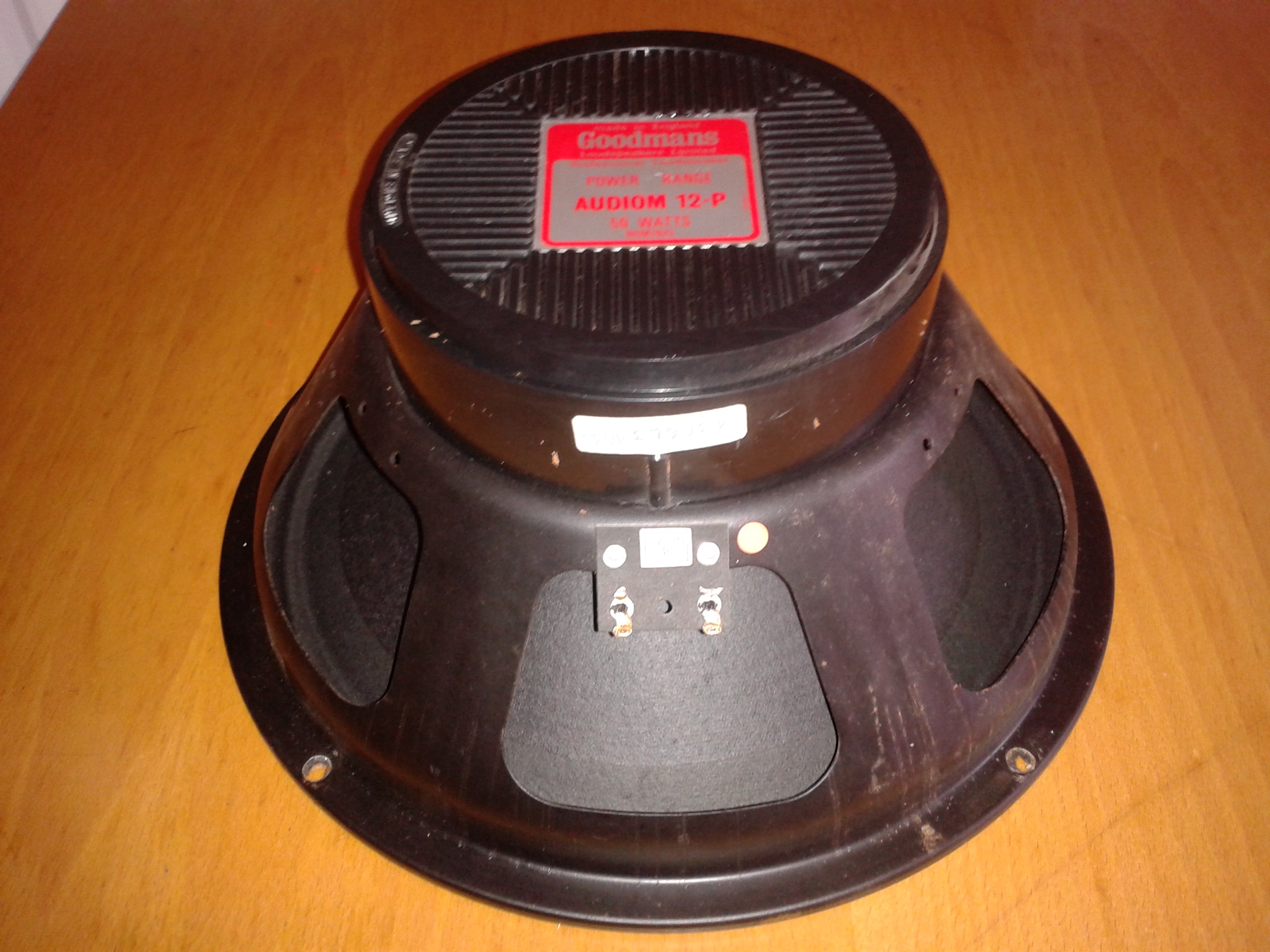
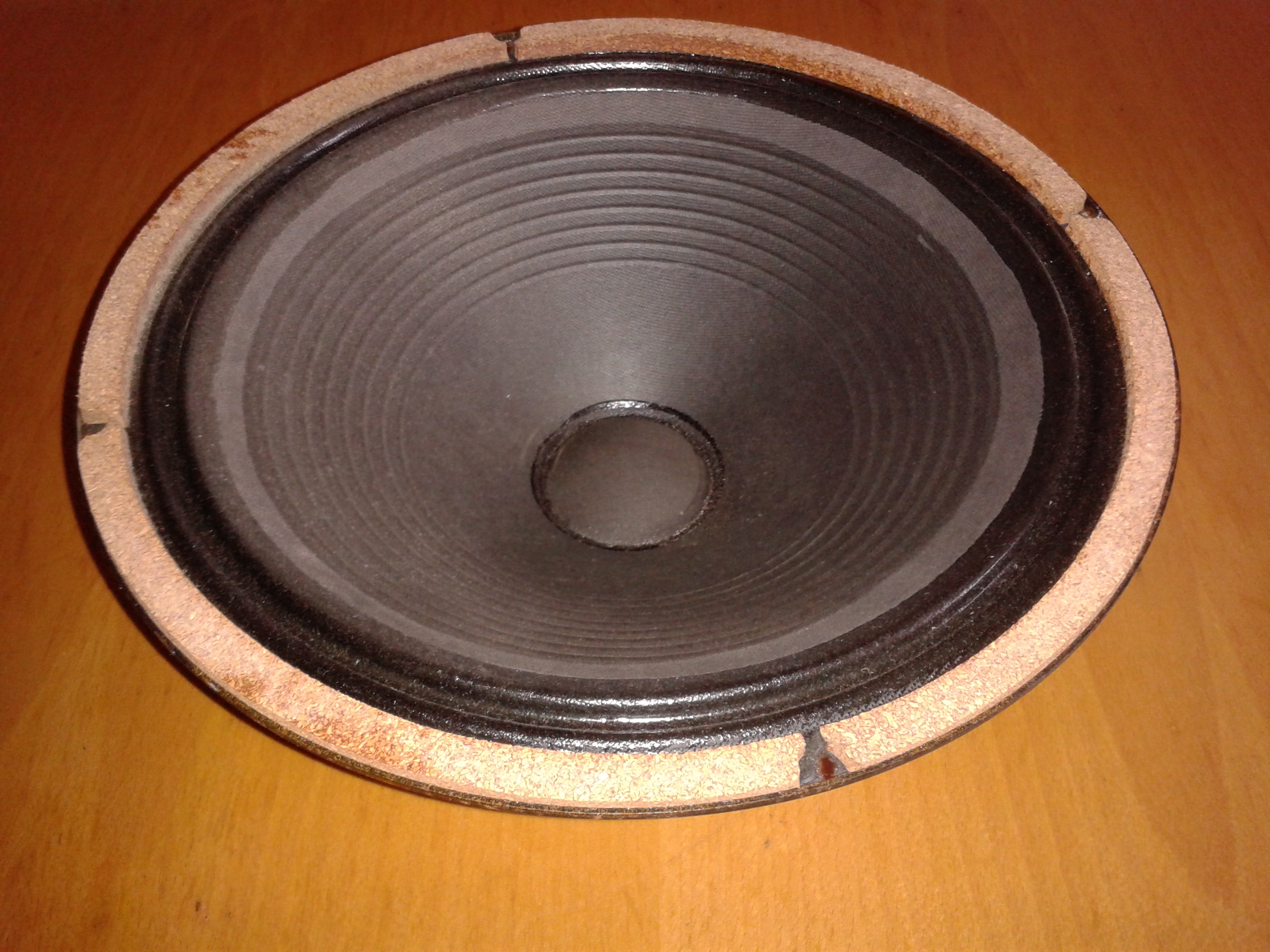
This 12P12" speaker was one of the three in the power range 12" pressed steel drivers from Goodmans, the other two being the 12PG and the 12PD. these speakers were the cheapest of the three, in actual fact the 12P was the original driver to use this particular pressed steel chassis, older examples using this chassis can be found with a green label on the back cover, considered a general workhorse they were used for just about everything, the 12P does not have a vent through the rear of the magnet like the other two in the range, but has a very smart looking plastic cover, in fact when you look at the build quality and embellishments like the back cover and the cork mounting face, they actually seem to look better made than the other two drivers in the range, however they were cheap and very reliable something sadly lacking these days - today you can get cheap but you don't get reliable.
They were the probably the most widely used 50w drivers for Disco and PA use in the UK, giving a very good sound, a popular configuration was 2 x 12 cab with Piezo electric horns giving a 100w full range cabinet , Disco Centre hire speakers were full of them, also found in combo guitar amps and 4 x 12 guitar speaker cabinets and just about every conceivable application you could think of, they were literally everywhere, I always considered them to be the bedrock of small time speaker systems in the 1970s, Goodmans must have made literally thousands of these drivers.
GOODMANS 12P - the speakers that powered a thousand sound systems!
Made by Goodmans loudspeakers Ltd Havant England
See below a HIFAX 50 HX
Cast aluminium horn flare
Integral crossover
Frequency range 3kHz -15kHz
Nominal power handling 50 watts
From the below 1977 price list we have done a historic price comparison
1977 price of £16.95 converts to a 2013 price of £89.35
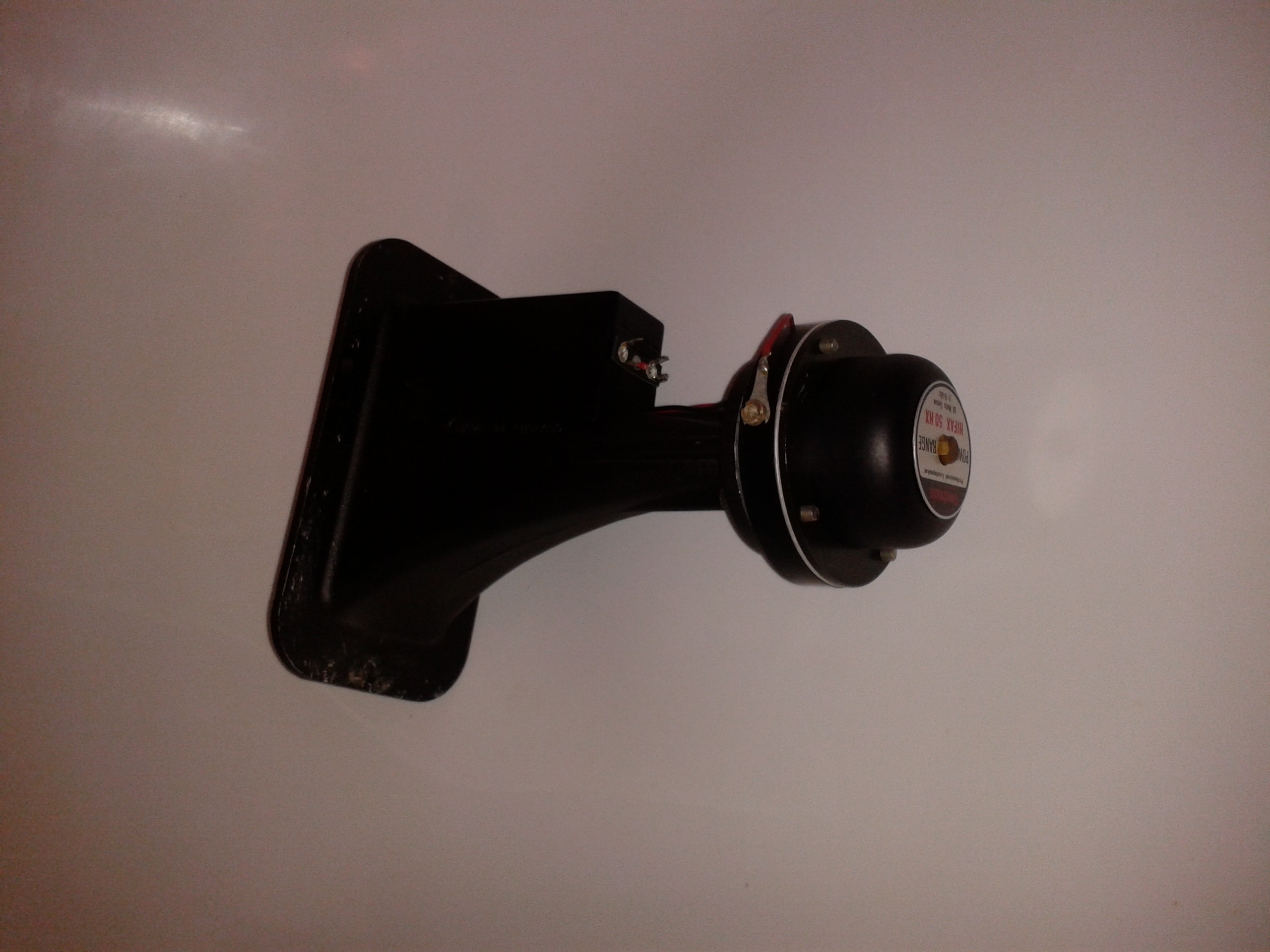
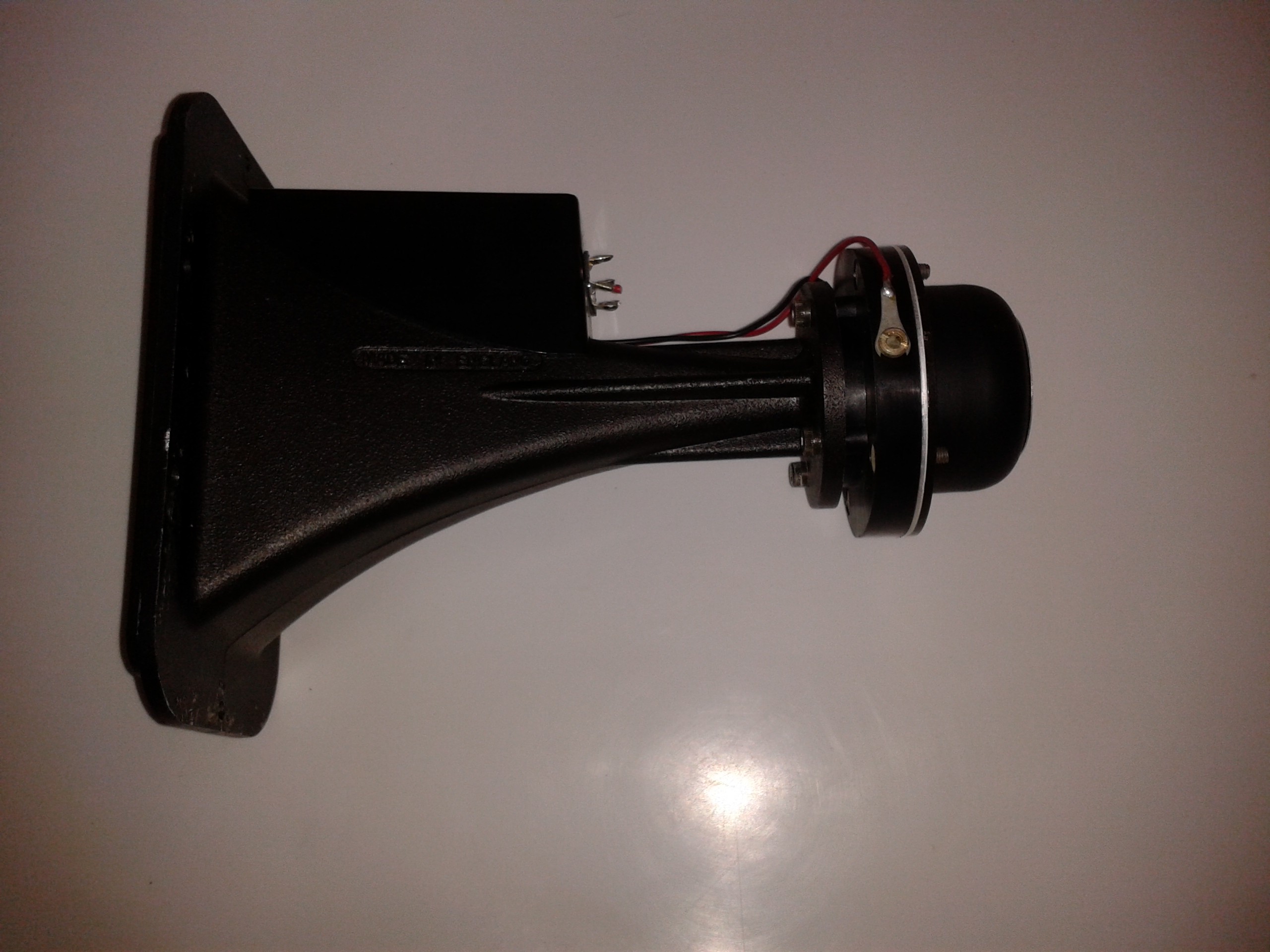
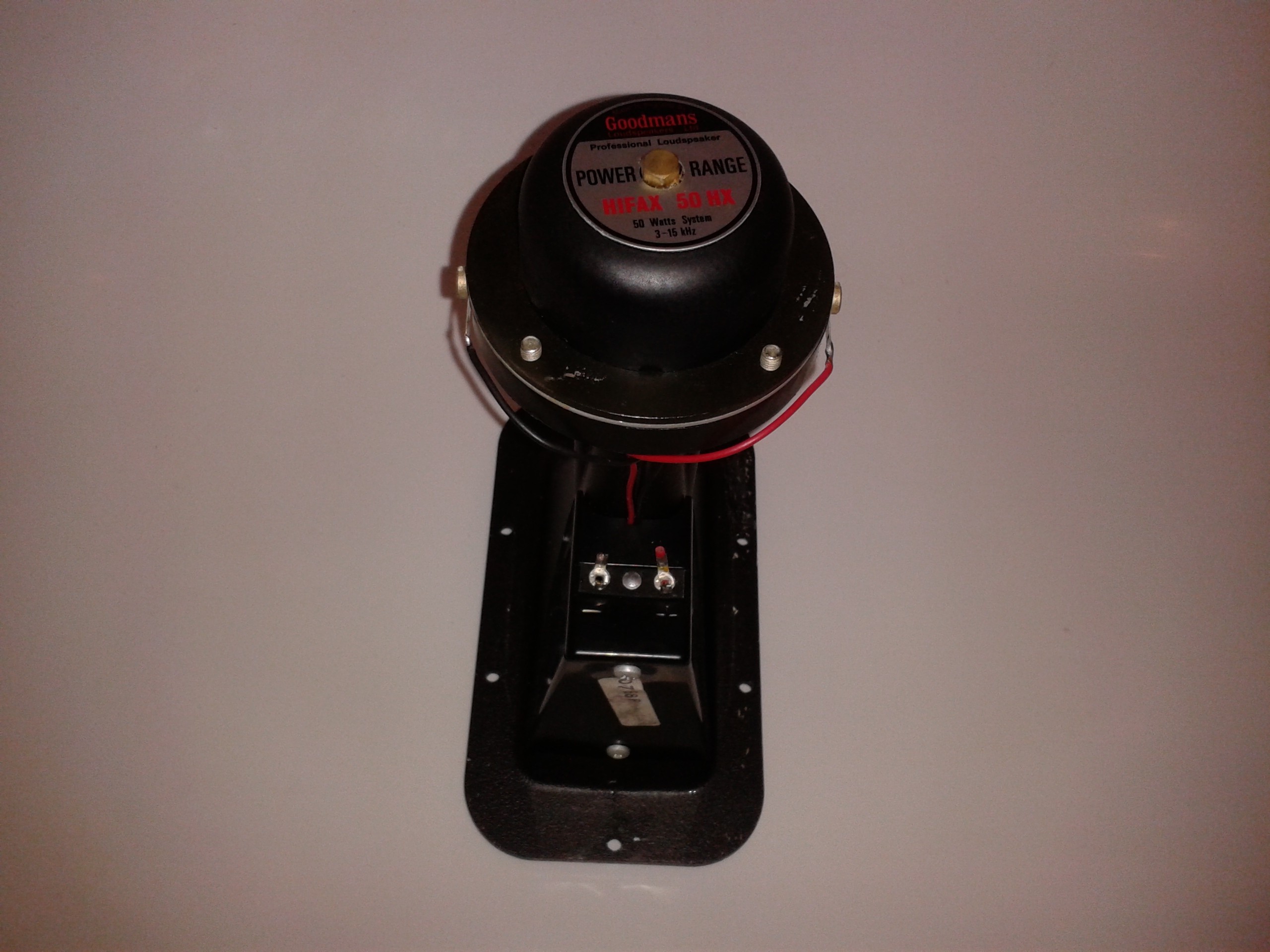
This Hifax horn is virtually identical to the model featured in the Goodmans catalogue - the Hifax 750 P
This model is however the Hifax 50HX, the physical dimensions are identical, the power rating is also 50 watts, the frequency range differs in that it is quoted at 3 -15 kHz on the rear of the unit, as apposed to 1.4 -12 kHz for the 750P, one would assume the compression driver performance would appear to be be the only difference, incidentally it uses the same value of capacitor and inductor in the integral crossover.
I do not know if these are a later improved version or simply a higher frequency version.
The original owner of the above Horns was an employee of EMI who used to own Goodmans, he purchased them through the staff shop in the late 70s, so they could well be a later improved version or perhaps there were several different models available, the 50HX could be better suited to the 12PD or 15P drivers with twin cones, as they have good performance up to and above 3kHz and the 750 P could be more suited to work with a 12P or 12PG that have a much worse performance at 1.2 kHz. and above, this is pure speculation as I have no data to backup this theory other than the claimed frequency range on the horns themselves, it might well be that here was no difference between the two other than a re-label.
The horns are quite rare these days, I believe the introduction of the Motorola Piezo electric horn in the mid seventies, rendered these type of horns obsolete for some lower end uses, although far superior to the Piezo horn they were much more expensive and were only really used by the more professional end of the market.
We have 2 pairs of these Hifax units, 2 Hifax 750 P and the 2 featured above Hifax 50HX, contrary to what you might believe the sound quality is excellent and not at all harsh or distorted, in fact just as good as any modern compression driver/horn.
Incidentally in the Goodmans brochure at the top of this page, the wiring configuration for these horns is incorrect, as they are rated at 50w (or 20v @ 8ohms) but in the hundred watt wiring configuration they would be exposed to the full output voltage of the amplifier 100w (or 28.3v @ 8 ohms) in all probability it would be better to disconnect the integral filters and wire the horns in series reconnecting just one of the filters to work with the two horns for a 100w configuration, this may be the reason that some of these horns failed in 100 watt applications.
Made by Goodmans loudspeakers Ltd Havant England
See below an 18P
Die cast Aluminium chassis with large magnet
Fundamental resonance 45Hz
Nominal power handling 100 watts
3" voice coil
Very efficient 96dB @ 1 metre 0. 6 W
From the below 1977 price list we have done a historic price comparison
1977 price of £39.95 converts to a 2013 price of £210.58
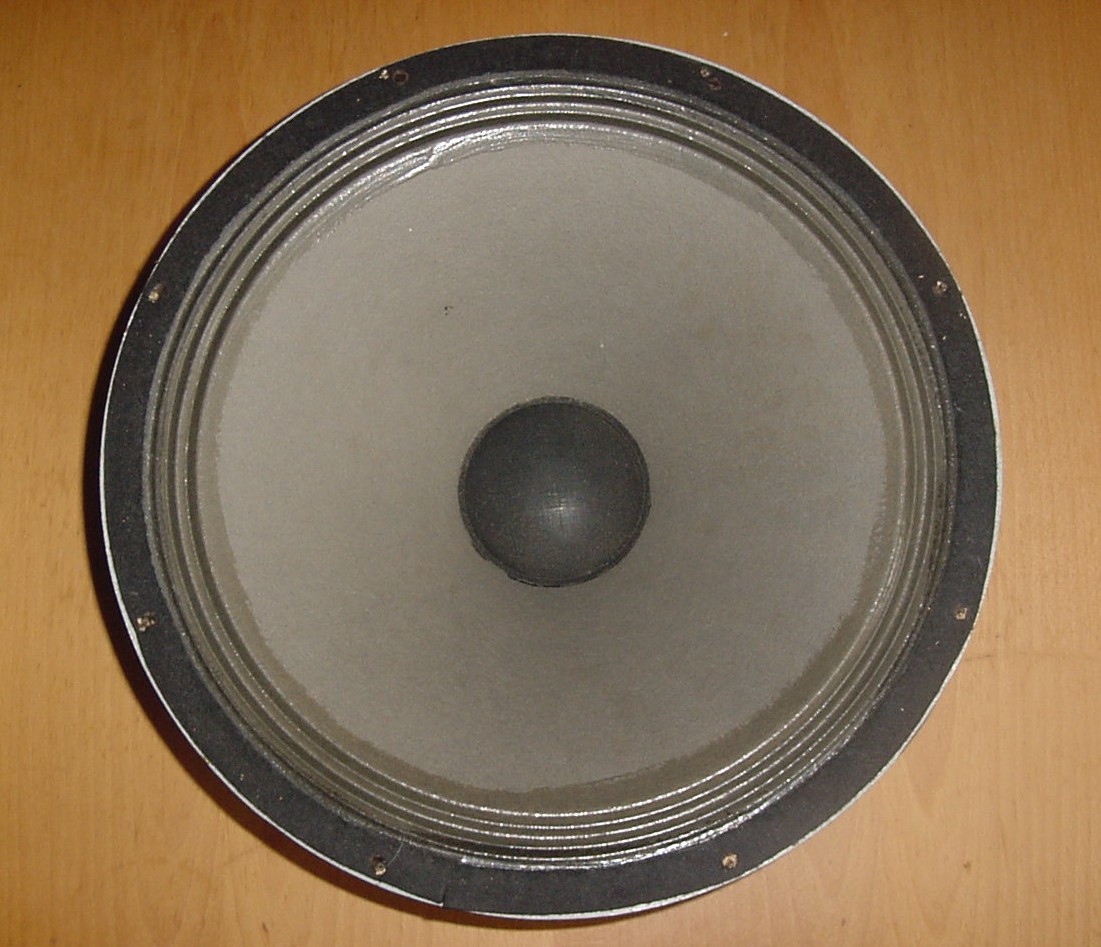
In the early 1970s these 18" speakers were the No 1 speakers to use for Bass guitar and Reggae sound systems in the UK, with a fantastic low frequency response down to 45 Hz, when first introduced were probably about the biggest speakers available, although Celestion had the G18C and Fane did introduce the 18" Crescendo with 150w power rating in the mid 1970s, the 18P if my memory serves me correctly was a good deal cheaper than the Fane, of course now days you can buy 18" speakers with a 1000w rating !
They were referred to as a showman's loudspeaker, one can only assume that many fairground rides benefited from the18P.
I believe in later years Goodmans up rated the power handling of these drivers to 200w under the name 18HP.
Incidentally I have found some pictures of the Celestion G18 C, it is astonishing to see that it looks identical to the18P, I would guess the chassis casting was made by the same manufacturer, it may be that they were indeed basically the same speaker, could it be that they were made by Goodmans for Celestion or indeed the other way round ? I have no idea !
I find it very hard to believe that these two 18" drivers were created totally independently of each other by two different companies, with what seems like virtually the same chassis and magnet assembly - probably the same 3" voice coil - similar cone - same back cover and ended up looking so identical purely by chance.
I wonder if there is anyone out there still alive who knows for sure whether there was indeed collaboration between Celestion and Goodmans, email us technicalsupport@ajaudio.co.uk if you have any information.
Update May 2016
I have had some correspondence with an ex Goodmans employee, he assures me that there was no collaboration between Goodmans and Celestion, however it seems that the chassis casting were almost certainly made by the same manufacturer - hence the similarity.
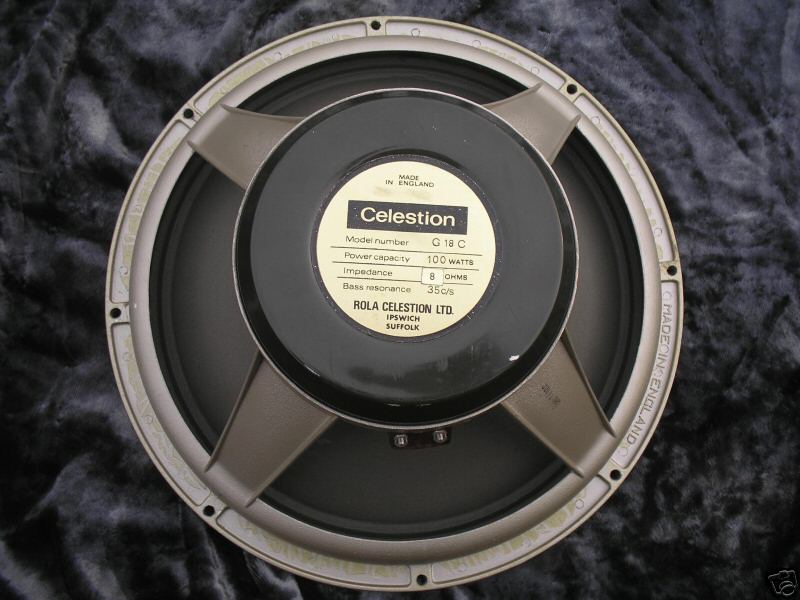
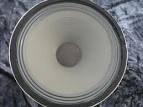
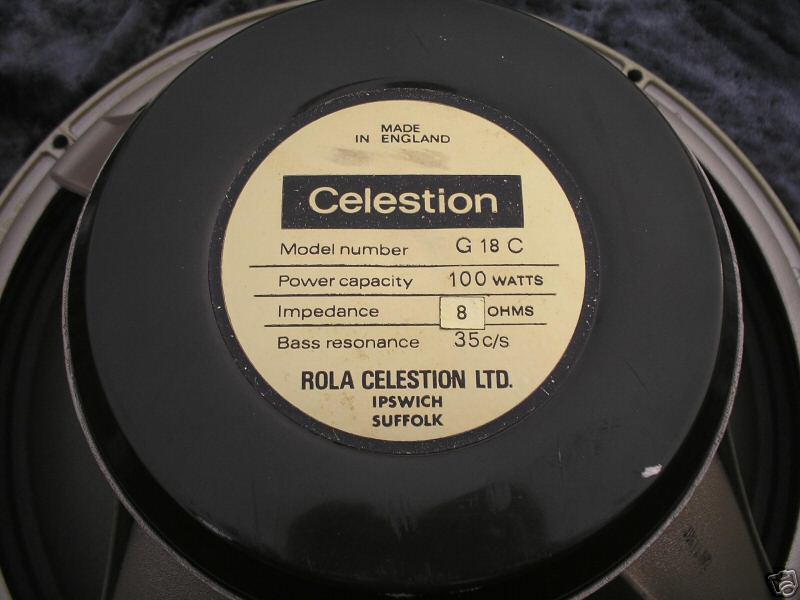
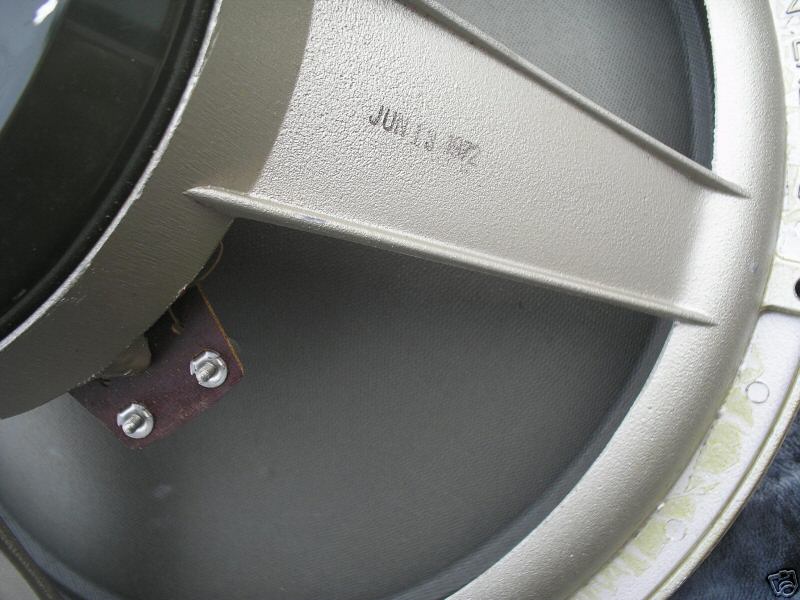
As can be seen in the below 1974 price list the Celestion G18C was £33.00 and the Goodmans 18P was £29.70 it looks like the Fane Crescendo 18" 150 watt was not yet available, however the Fane POP 100 18" speaker was £21.45
Update
We have found an advert from June 1972 for the Fane Crescendo 18", so it does prove the existence of a UK made 150w 18" speaker as early as 1972 - however it was £36.75 - very expensive, interestingly also a Goodmans 12P 50W was also advertised at £10.90
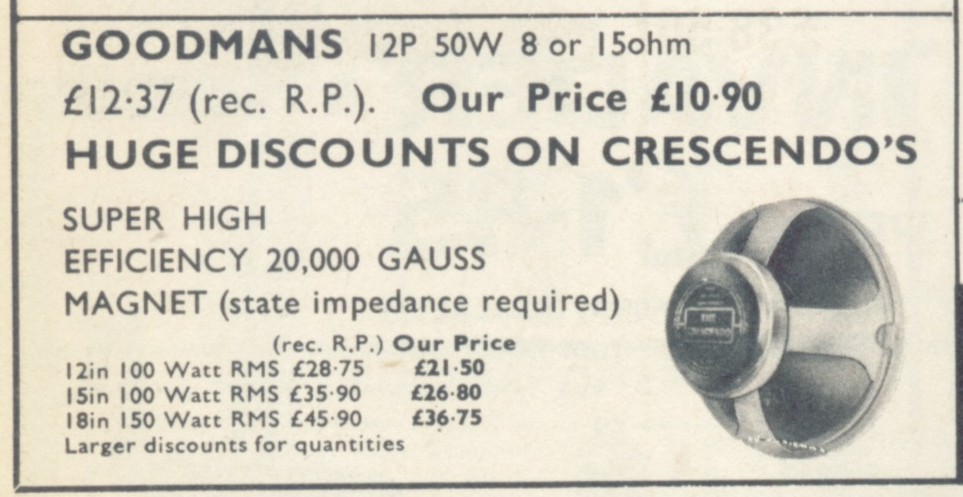
It is also interesting to note that absolutely no Chinese made speakers were available in 1974!
Wilmslow audio price list 1974
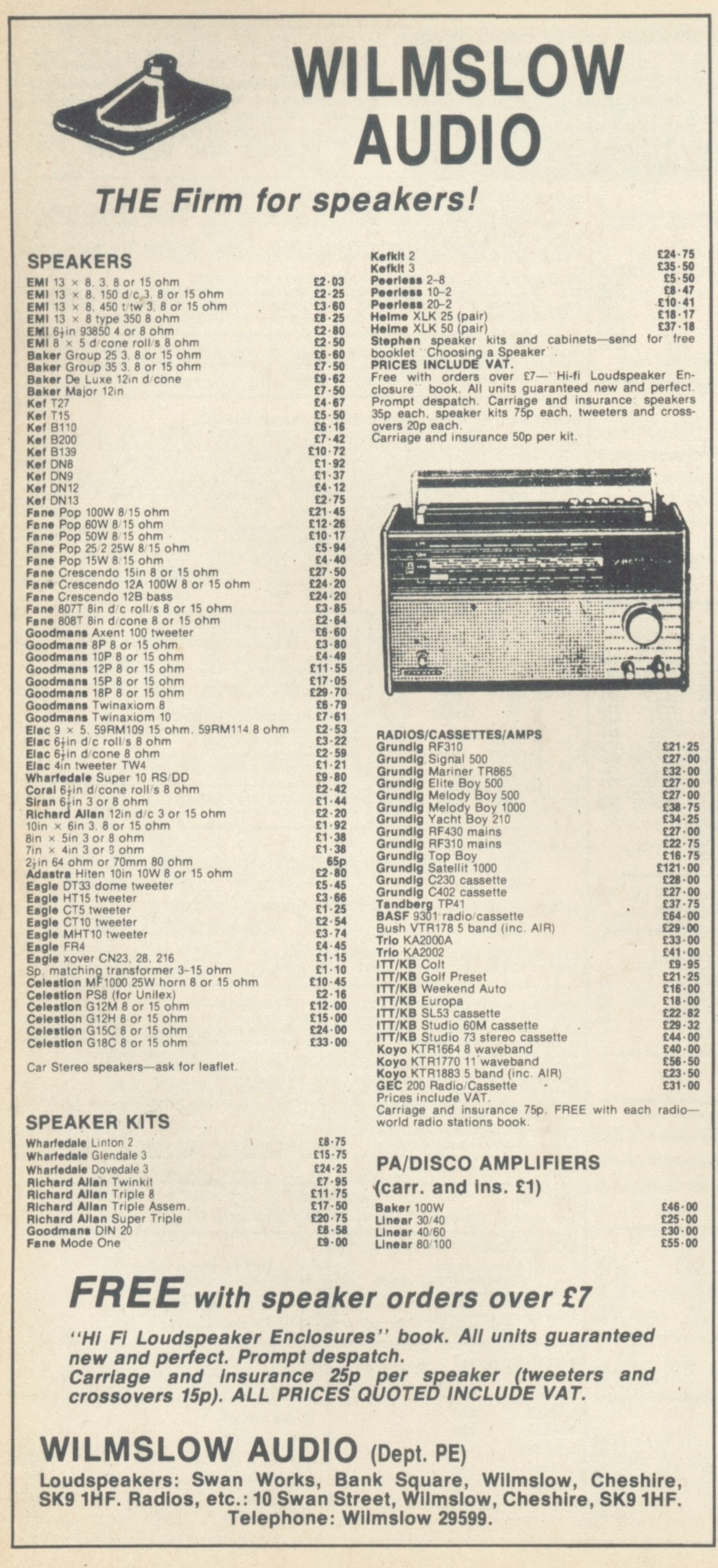
By 1977 they were both priced at £39.95 and the Fane Crescendo 18" 150w was £75.95, so you could buy two 18P speakers for the price of one Fane Crescendo. The Goodmans Audiomax speakers were available by 1977 as well as the Hifax 750P which incidentally cost more than a Goodmans 12P.
From the below 1977 price list if a historic price comparison is done it, reveals these speakers were not to far off today's prices in real terms, so it rather blows the myth away that the UK can't compete with foreign made companies, of course the power ratings were lower but then all power ratings were lower in the 1970s, and the cost difference now of making a 100w voice coil and making a 800w voice coil is pretty insignificant.
Wilmslow audio price list 1977
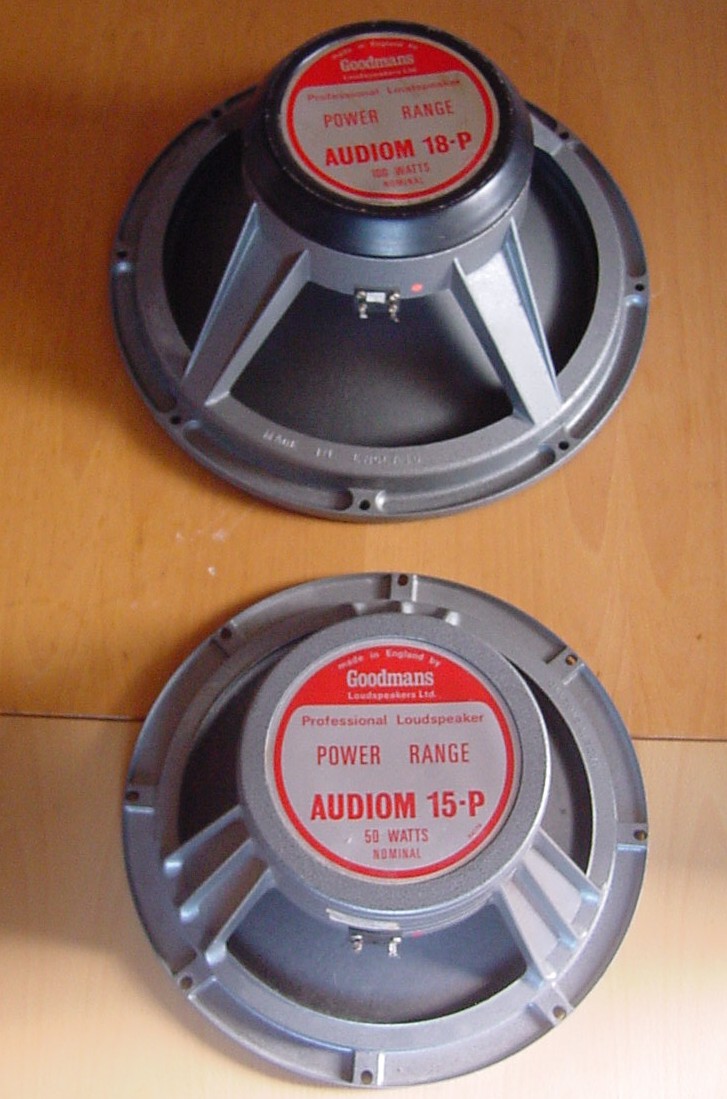
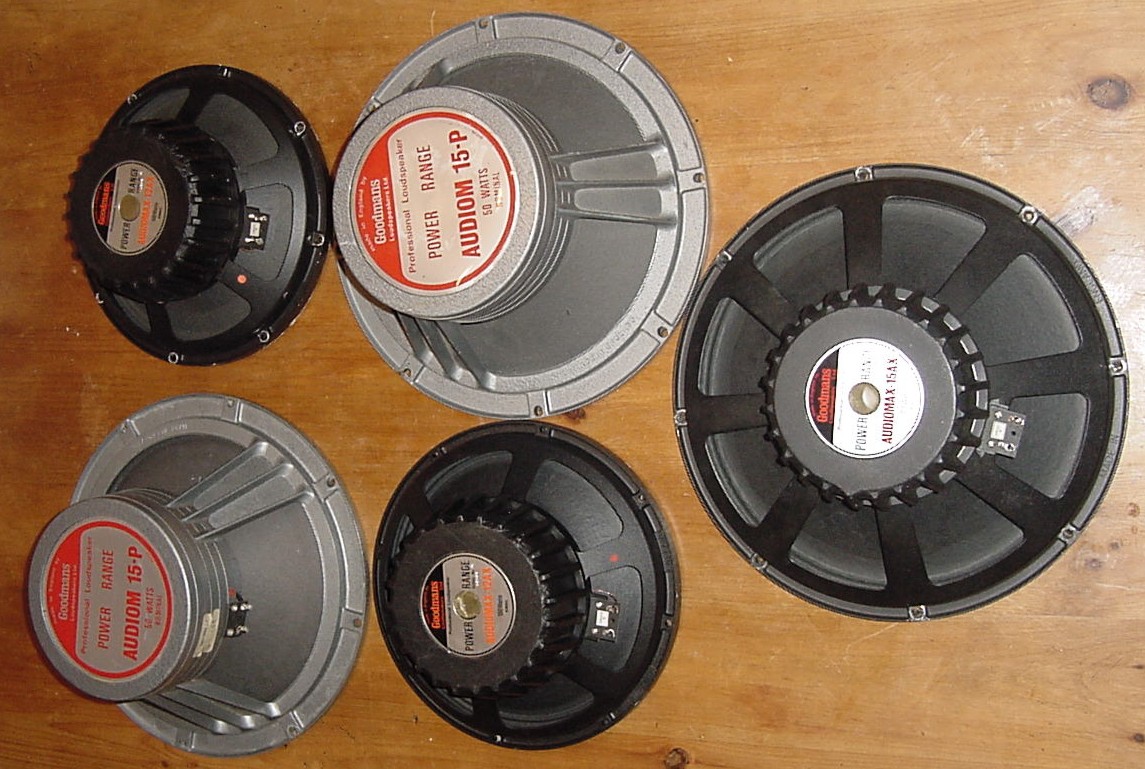
See a comparison of the 18P to the15P, and a collection of Goodmans Power Range Speakers
A word on re-coned drivers
Be very careful when purchasing these type of classic drivers, some are being offered for sale that have quite clearly been re-coned, whilst this may not necessarily be a bad thing it has to be remembered that what makes the distinctive sound of a loudspeaker is dependent critically on the cone and the voice coil, thus only a factory original replacement kit will give a speaker the correct and original sound, with a modern replacement kit fitted, it will work but it will not be the same speaker at all - buyers beware
See below a Selection Goodmans HI FI Speaker Brochures from the long distant past
Click on the images for the PDF of the Brochure.
The Goodmans Axiom 150 MkII although only rated at 15 watts had the most fantastic clear quality sound, really good Bass and high frequency response, we used one of these in our first mobile disco set up and although it was years old and a very tatty looking performed very well - possibly even better than the Goodmans 12PD.
A word on re-coned drivers
Be very careful when purchasing these type of classic drivers, some are being offered for sale that have quite clearly been re-coned, whilst this may not necessarily be a bad thing it has to be remembered that what makes the distinctive sound of a loudspeaker is dependent critically on the cone and the voice coil, thus only a factory original replacement kit will give a speaker the correct and original sound, with a modern replacement kit fitted, it will not be the same speaker at all - buyers beware
Wharfedale Speaker catalogue from the 1960s
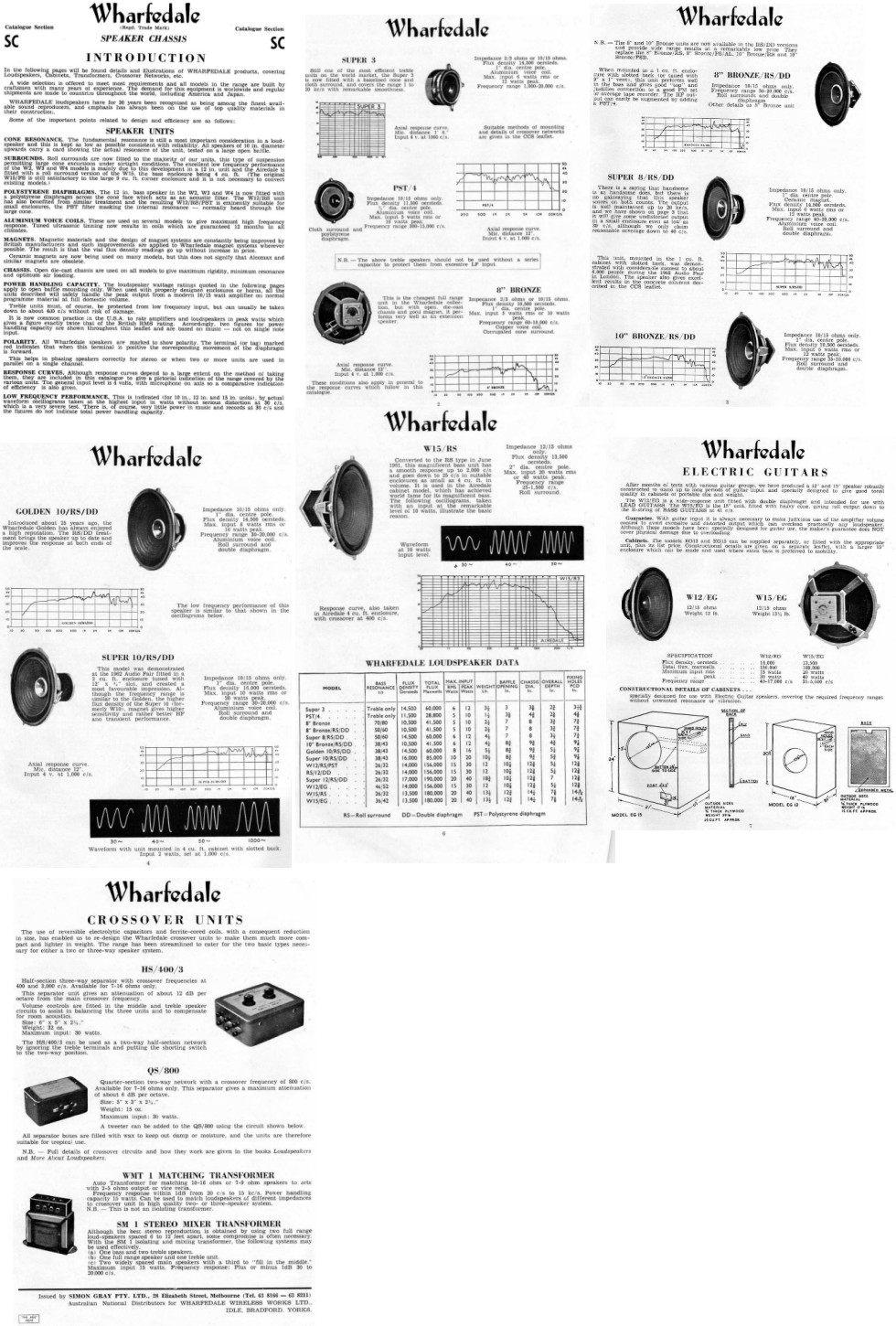
See some actual examples below of the speakers featured in the above catalogue
See below a W15/RS from 1970, introduced originally in 1961
This model has a round magnet but originally these were fitted with the more old fashioned square type until being upgraded in the late 60s, as can be seen in the picture the original cast chassis was still used with square magnet mounting, a round ceramic magnet was simply fitted, the end result was a much shorter front to back lighter driver. In fact apart from the relatively low power rating they compare very favourably with more modern drivers, with very good low frequency response, often used an Airedale cabinets - a curious design from the 60s where several eighth of an inch slots were cut in the rear of the cabinet running the entire length top to bottom, one can only assume this acted like some kind of tuned vent/port.
This design preceded the Thiele/Small reflex design method that was first published in Australia in1972 and was not really taken up by manufacturers until the mid to late 70s, I would hazard a guess that most of the early ported PA speakers available were not even properly designed ! still the Airedale design was very well received. in hi fi circles
Wharfedale W15/RS
Made by Wharfedale Wireless works Ltd Bradford England
Cast aluminium chassis
Chassis diameter 141/4 "
12/15 ohms
20w RMS - 40w Peak
2" voice coil
25 - 1500 c/s
Roll surround
Considering these drivers are from 1970, (27/01/1970 to be precise - 43 years ago) they actually look remarkably modern
See below a pair of Wharfedale Super 8/RS/DD from 1970 introduced in the 60s, these twin cone speakers give remarkably good performance, as above they are fitted with round magnets where as the original version would have had the large long square magnet, good full range speakers for HI FI use and low power PA work in the 60s and 70s.
Wharfedale Super 8/RS/DD
Made by Wharfedale Wireless works Ltd Bradford England
Cast aluminium chassis
Chassis diameter 8"
10/15 ohms
Resonance 50/60 Hz
5w RMS - 10w Peak
1" voice coil
60 - 10.000 c/s
Corrugated cone surround
Double Diaphragm (twin cone)
Wilmslow Audio Catalogue from the 1970s
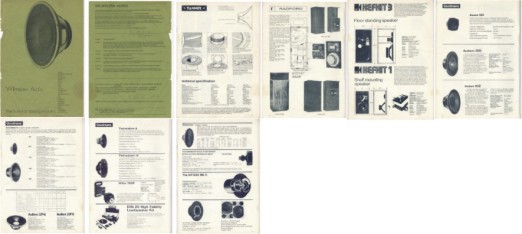
This catalogue features drivers from Fane, Celestion, Baker, Tannoy, Radford, KEF, DECCA, Jordan watts and Goodmans, it is interesting to note that the Goodmans 12PD, and 12PG speakers are rated at 50 watts in this catalogue, but by the mid seventies they had been upgraded to 60 watts as seen in the Goodmans catalogue at the top of this page, one wonders if there was indeed any difference at all, maybe Goodmans were pushing the quoted spec to the limits of what they could get away with, I personally ran a couple of 12PDs in the 1970s for Disco use, they were very sweet sounding speakers indeed, Incidentally the designation was 12 P for 12" power range, or 12PD for 12" power range Disco or 12PG for 12" power range Group/Guitar.
I also ran a couple of 12Ps they were not a patch on the 12PDs high frequency sound wise however these 2 sets of Goodmans drivers were thrashed all the time flat out but we never had one fail.
We also ran some Baker group 25s, they were ok but not really very practical at 30 w power rating
Fane and Celestion were the other contenders in 1970s, Fane produced some good 100w drivers and HF Horns that were used extensively in the UK, Celestion had some 60w G12 variants that sounded great.
It is with regret that the only company from the above catalogue still British owned is Fane.
Fane www.fane-acoustics.com are based in Yorkshire, and continues to this day to manufacture loudspeakers in West Yorkshire, England.
Celestion www.celestion.com are based in the UK but are owned by Gold peak batteries and most of their speakers are Chinese built.
Goodmans has gone, the name lives on, used on foreign made consumer electronics items, but has no connection with Goodmans Loudspeakers Ltd
.


H&H Speaker catalogues from the 1980s
See some actual examples below of the speakers featured in the above catalogue
See below an H/H 1200B
This speaker from 1984 is one of a pair used in single 12" bass bins, apart from some flaky paint the speaker still works perfectly, it is similar to the Audiomax above in that it employs the same sort of design features, this model is the 1200B version - for bass use , there was also a 1200E featuring a metal dome - for extended upper frequency response, these two were the updated versions of the driver as the original model 1200 had a 150w power rating, the next model that came along was the1201, this was rated at 250 watts. These speakers are a fantastic example of over engineered drivers like the Goodmans Audiomax,
H/H 1200 B
Made by H/H Acoustics Cambridge England
Cast magnesium chassis with large magnet and colossal heatsink
Fundamental resonance 80Hz
200W power rating
3" high temperature voice coil
Super efficient I w @1 meter 101dB
Curiously modern drivers are able to handle in excess of a 1000w but don't employ heatsinks on the magnets, indeed neither did the more modern H&H 1201s.
This type of driver however was a great leap forward from the Goodmans 12Ps and Celestion G12s available in the late 1970s, as amplifier powers were increasing the need for more powerful speakers was gathering pace, it has to be remembered that although very high output solid state amplifiers with powers in excess of 350-500w were available in the mid 1970s at a very high price, most amplifiers for Disco or PA work available and used in the UK did not exceed about 200w, with a few exceptions the vast majority of discos and bands had 100 w into 4 or 8 ohm solid state, or 50w to 200w into 8 ohm valve amplifiers, hence generally the most powerful speakers Pre - say 1974 in the UK were available with a maximum power rating of about 150w, in those days if you wanted more power you just ran multiple amplifiers and speakers, I seem to recall in 1977 the Froggy/DLT Road Show were using several custom MATAMP valve 200w amplifiers and about six 2 x 12 custom orange coloured cabs each side of the stage to achieve what must have been about 1kw plus.
See below an H/H PL50
This speaker from 1977 is one of a pair fitted as standard in an HH VS musician, valve sound combo Guitar amplifier, it appears to use the same chassis as the 1200B above although it uses a much smaller magnet, rated at 50 watts, 2 drivers were used paralleled up giving a total power rating of 100w at 4 ohms, with a silver sprayed fabric dome, these speakers seem to be as well made as their bigger 200w cousins.
H/H PL50
Made by H/H Acoustics Cambridge England
Cast magnesium chassis with Small magnet
50W power rating
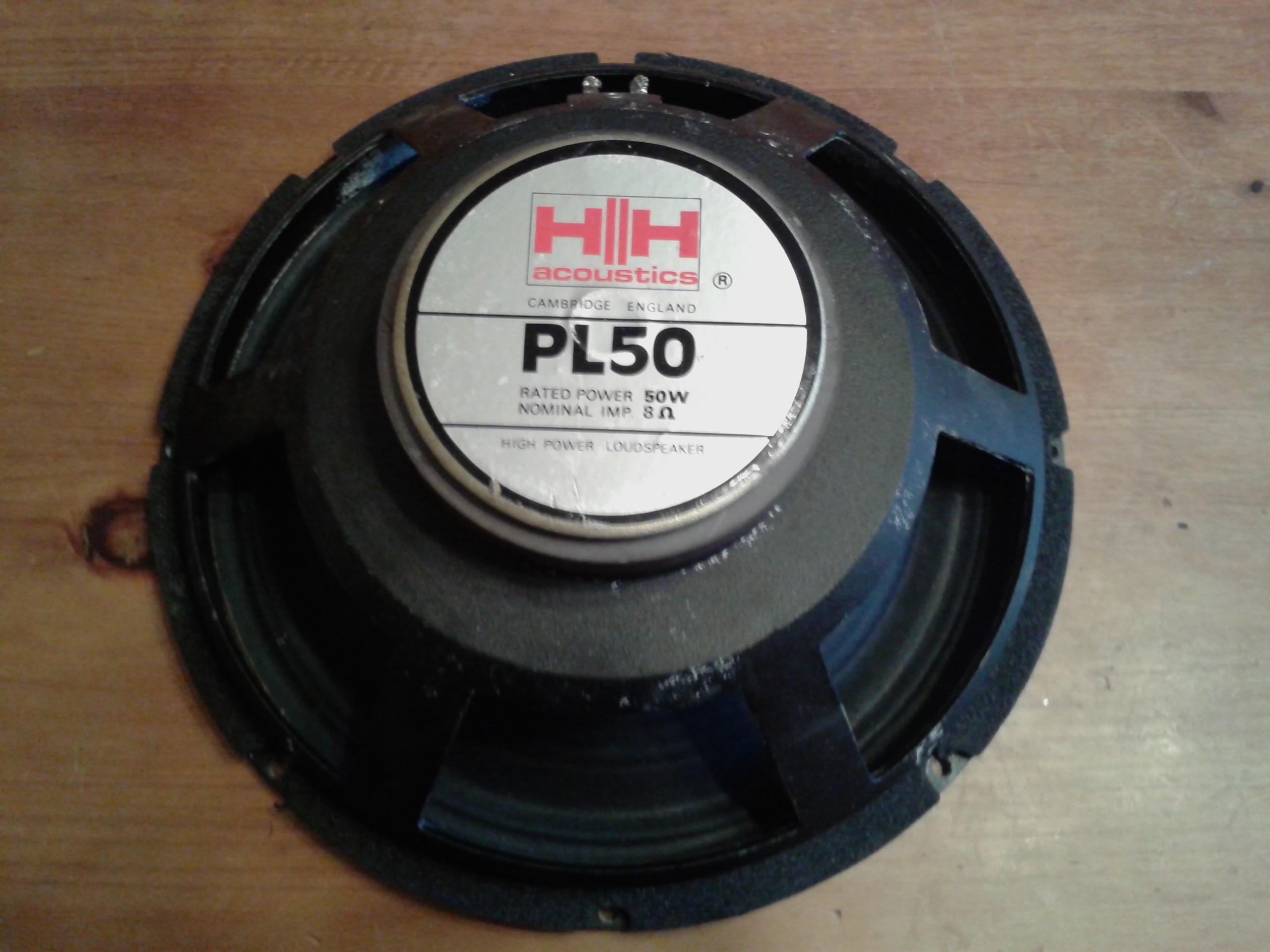
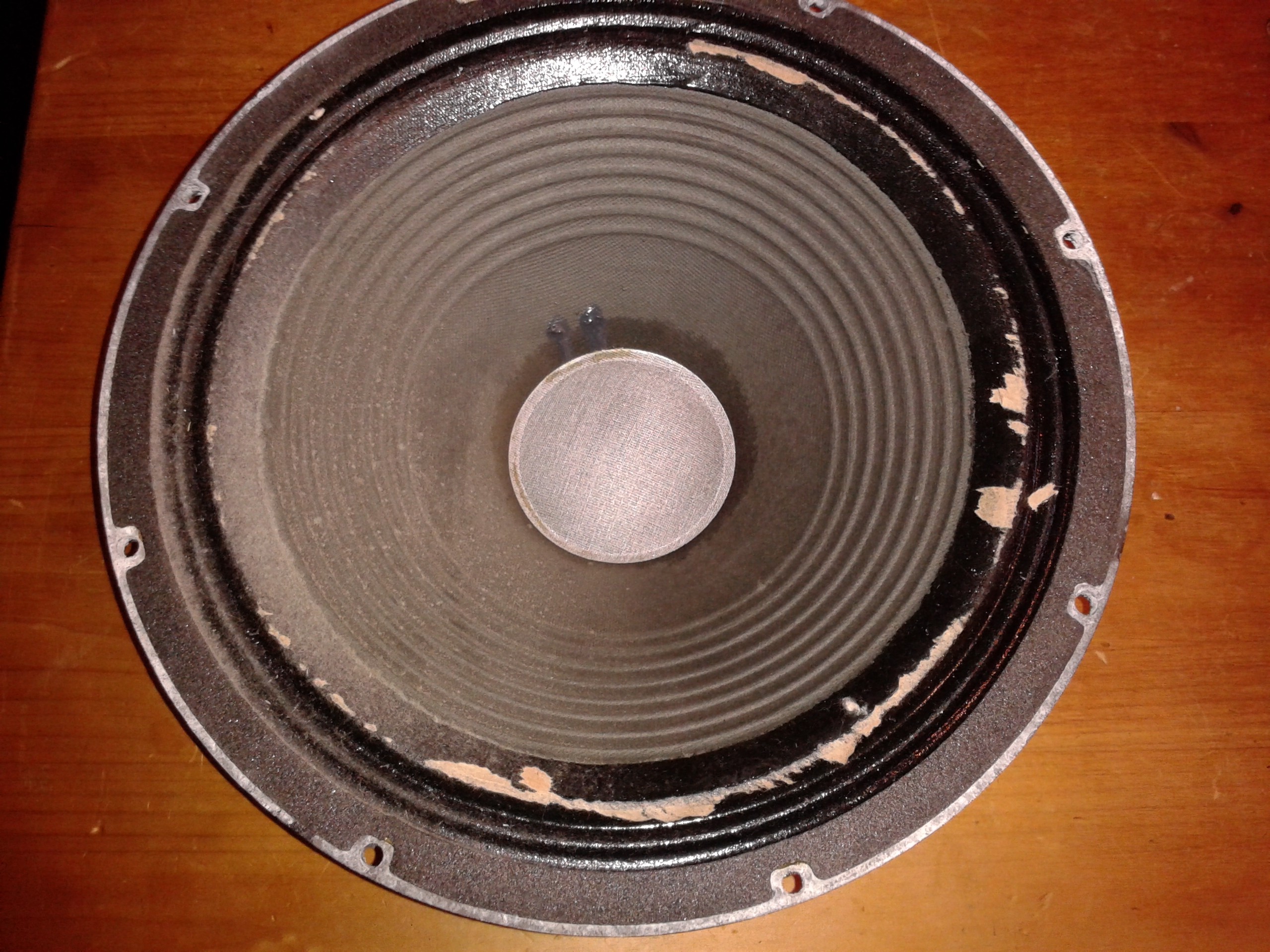
BAKER
See below a BAKER GROUP 100
This speaker is we think from the late 70s or early 80s it is rated at 100 watts with a claimed frequency range from 30Hz to 16kHZ although I doubt whether in reality an upper limit of 16kHZ would be achieved, I know nothing about the origins of the Baker speaker company other than they were made in England, we ran a couple of their Group 25s in the late 1970s they were rated at 30w,and proved to be quite reasonable sounding drivers with really good Bass - although limited by the meagre 30w rating, one characteristic that all Baker speakers shared was that they all had the roughest aluminium chassis castings you ever saw ! you can see evidence of this from the below picture, where all the rough edges have been ground smooth by hand, no powder coating just the bare metal, and yet at the business end of things, the magnets and cones seemed to be of very good quality, they also were one of the few manufactures to offer 3, 8, or 15 ohm impedances, this of course was the standard impedance taping arrangement for valve amplifiers in those days.
Baker had a wide range of speakers in the 1970s - PA speakers from 12" 15w to 15" 75w and some 12" and 15" hi fi drivers a well, it seems the speaker featured below was probably a later model, as it has a 100w rating and could have been be one of the last to be made, as we can't find any evidence of a group 100 speaker being advertised at least as late as 1977.
BAKER Group 100
Made by Baker in England
Cast Aluminium chassis with Large magnet
Power rating 100W - (200w USA)
Claimed frequency range 30Hz to 16kHz
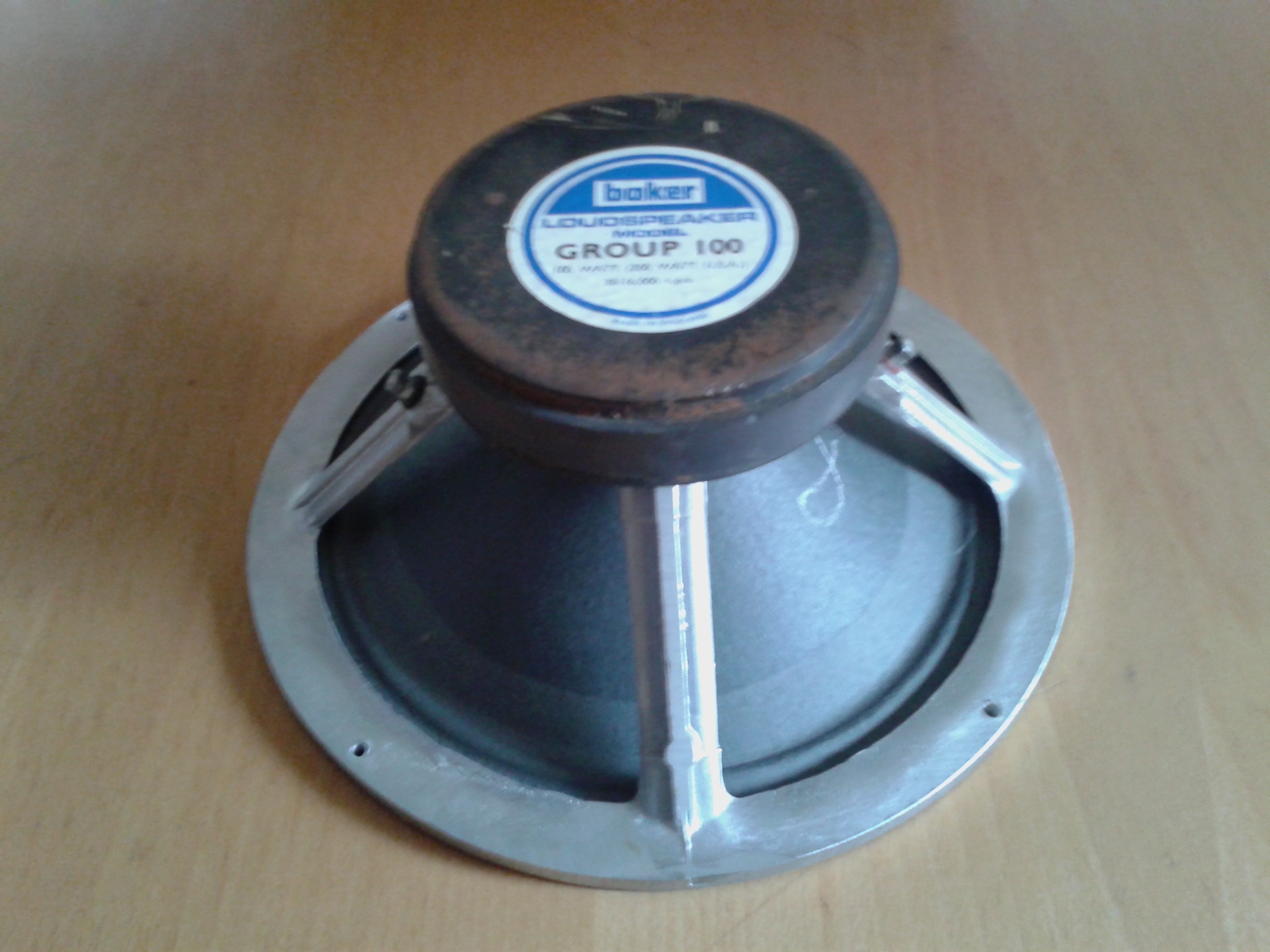
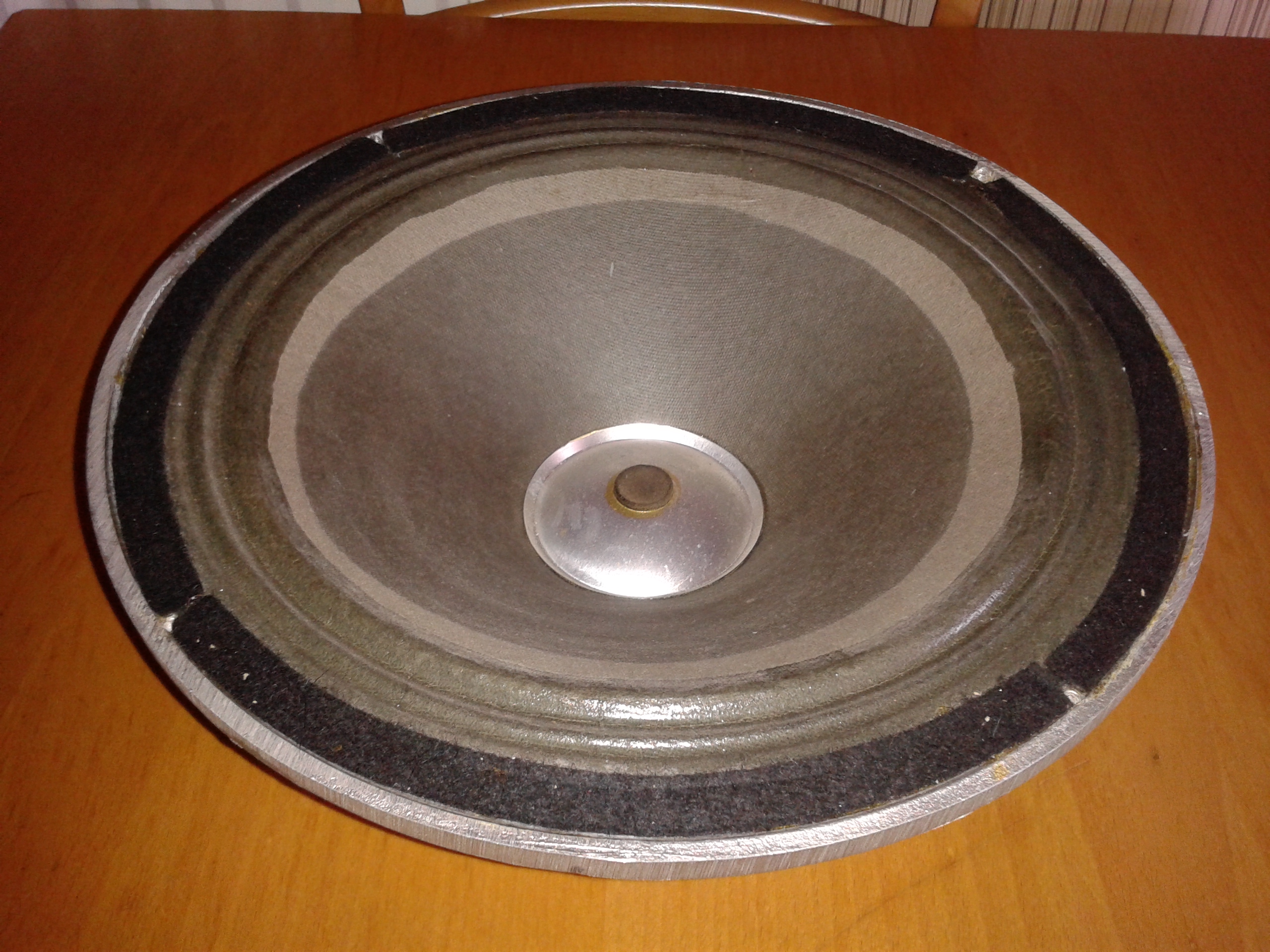
See below a couple of Baker adds from 1977
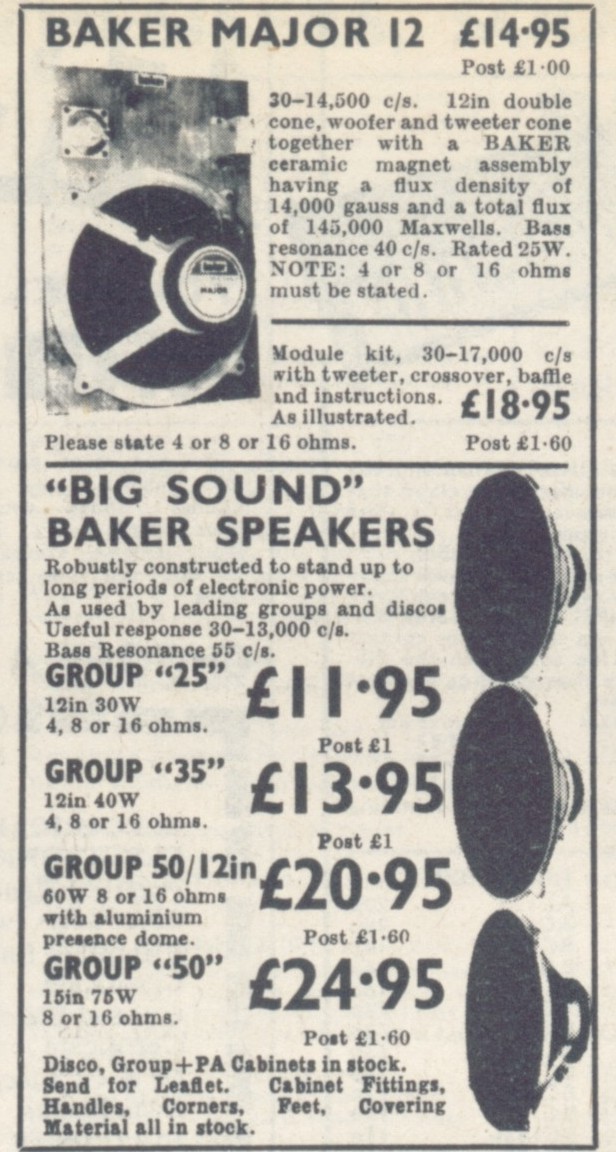
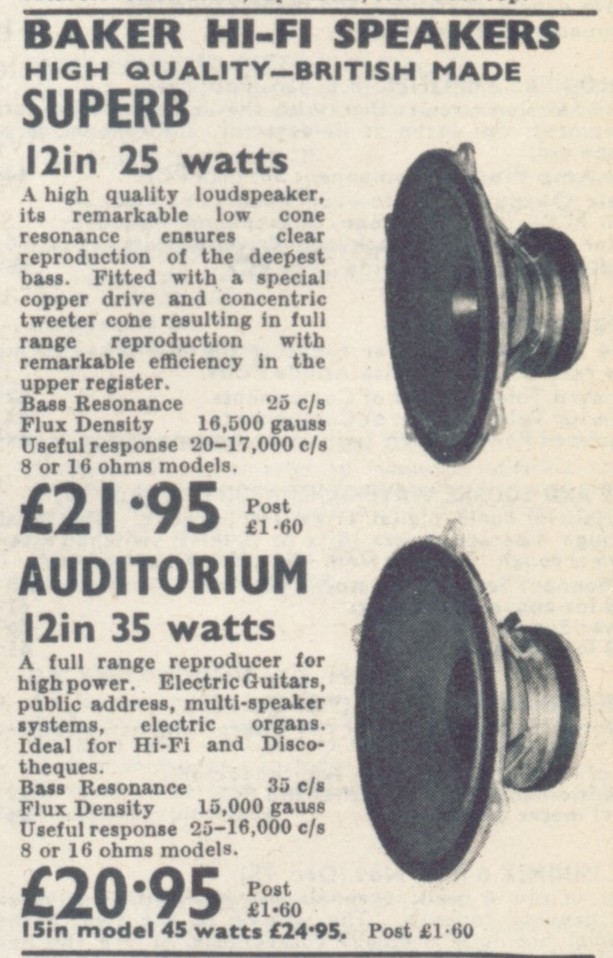
We would take a guess that Baker were in fact an own brand make of RCS, a supplier of amplifiers, speakers, record decks etc based in Croydon, who I believe are still in business online, although their shop at 337 Whitehorse Road Croydon is no longer open, whether they actually got them manufactured exclusively by somebody or were just suppliers is unknown, they were never really in the same league as Goodmans, Celestion or Fane, however they were cheap and worked well enough.
Update
We have found and advert from June 1972 from a firm called Baker Reproducers ltd - could these people have been the elusive manufacturers of the Baker range of speakers ?
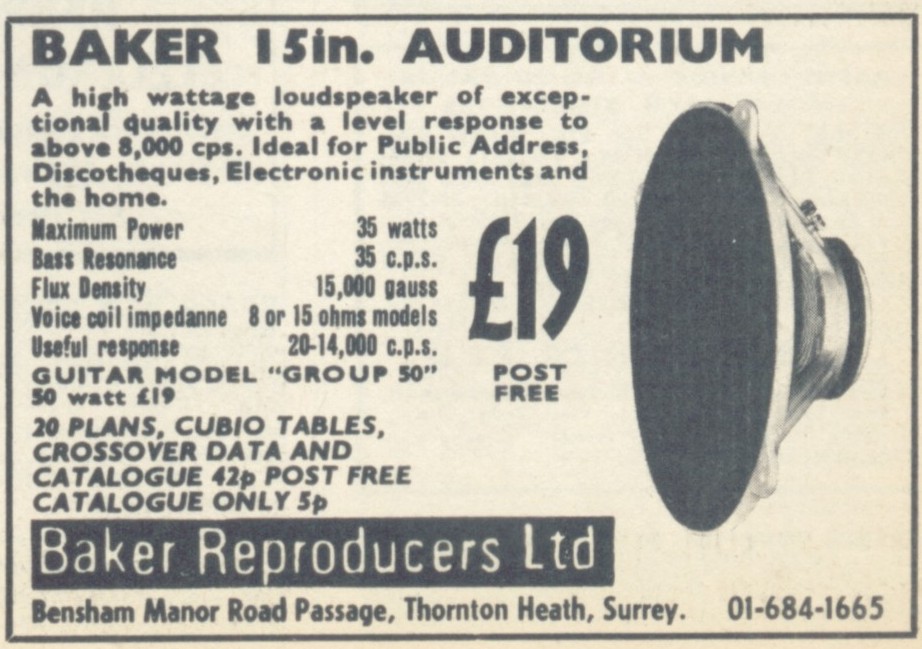
Probably not as we have also come up with this
COMPANY IDENTIFICATION
Company name: BAKER LOUDSPEAKERS LIMITED
Incorporation Date: 29/08/1972
Registered Office: 337 WHITE HORSE ROAD, CROYDON, SURREY, CRO 2HS
Company Status: Dissolved
So the theory that Baker were an own brand of RCS still stands, it may be worth looking to see for any evidence of Baker speakers being available before 1972.
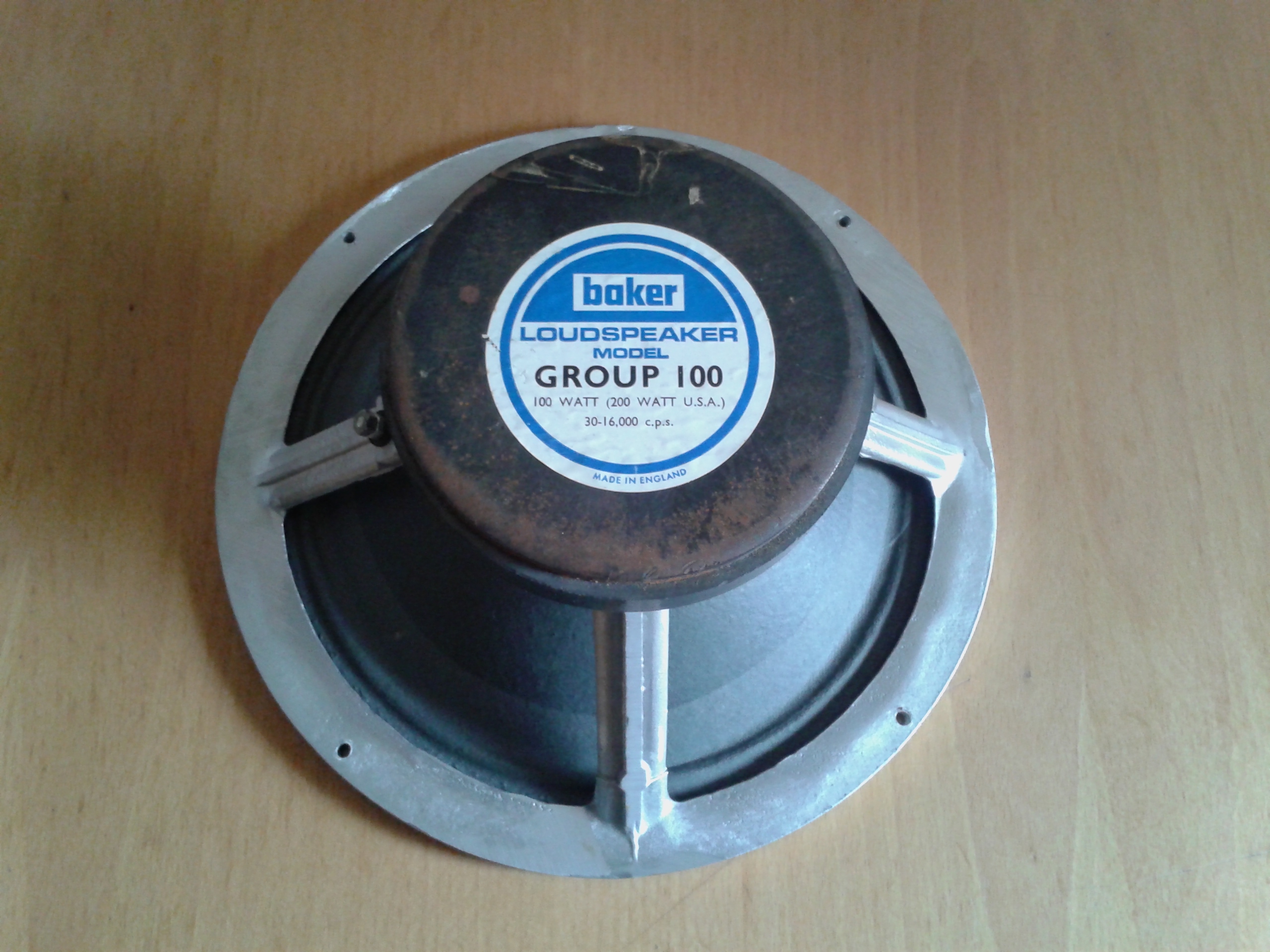
©2016 A&J AUDIO. All Rights Reserved.